216. United States v. Apple (Complaint)
March 21, 2024 the United States filed an antitrust complaint against Apple. The filing is a new approach to antitrust and hinges on mostly how Apple chose to design the iPhone from the very start.
“If you’re weak on the facts and strong on the law, pound the law. If you’re weak on the law and strong on the facts, pound the facts. If you’re weak on both, pound the table.”
— Oliver Wendell Holmes1
There’s a lot of table pounding going on.
In United States v. Apple, the Department of Justice and 16 states with the District of Columbia filed a lawsuit alleging Apple to have abused its market position illegally under the Sherman Antitrust Act. The release can be found here and filing here.
This is the very first step in what will last at least 5 years and perhaps 10, though a settlement or withdrawal is possible at any time. The antitrust legal process is a lot like those early Apollo program drills in The Right Stuff. There is silence and nothing for long stretches of time and then suddenly there are red lights, sirens, and steam flying out of pipes everywhere—moments of sheer terror. This goes on for years. Patience is required. You can’t even predict who is ahead at any given time.
Right now the vast majority of analysis will claim this is a landmark case. The government is presenting a very strong case. This is a new era in the digital economy. In other words breathless coverage. They have to say this. Why? First, they are the only two parties talking now after reading the filing. There’s the antitrust world of academics and activists. The people who talk now are those that always want more antitrust. They spend their careers studying the topic and see antitrust with every big company at scale. There is literally nothing more exciting in the entire field than going after the biggest and most successful company of an era. Second, there are the regulatory critics that have long disliked technology and especially big technology companies. “Going after big tech” is a natural endpoint. These are the experts quoted in stories right now. The people who are not saying anything? Apple of course. And antitrust defense counsel who are always low key. And when someone from tech raises objections their opinion is instantly dismissed as both obviously biased and an ill-informed layperson.
What follows are some of those ill-informed opinions of a layperson and tech person that spent almost two decades deeply invested as a participant in antitrust. But correct, I am not a lawyer.
As observers and for my friends at Apple, an important aspect of the case to keep in mind is that most steps in the process are legal steps—plodding, boring, and deeply technical from a legal perspective. A few of them are constructed for legal as well as public relations optics. This initial filing is mostly an optics step. Short of a dramatic case dismissal (which Apple will certainly file) or dismantling (which a judge could do in response), the filing is meant to stir emotions and create a broad base of public support and awareness while providing just enough to continue the legal journey. The effort is as much politics as it is legal. That’s why there are no footnotes or citations. We know because they quote Steve Jobs, but since he has passed and cannot be cross-examined in the context of this case it really isn’t there for evidence as much as the headlines. I personally found that deeply offensive. This is a story with hints of the facts that will form the basis of the argument. You cannot judge the strength of the case on what is filed today, though you can see where it is going.
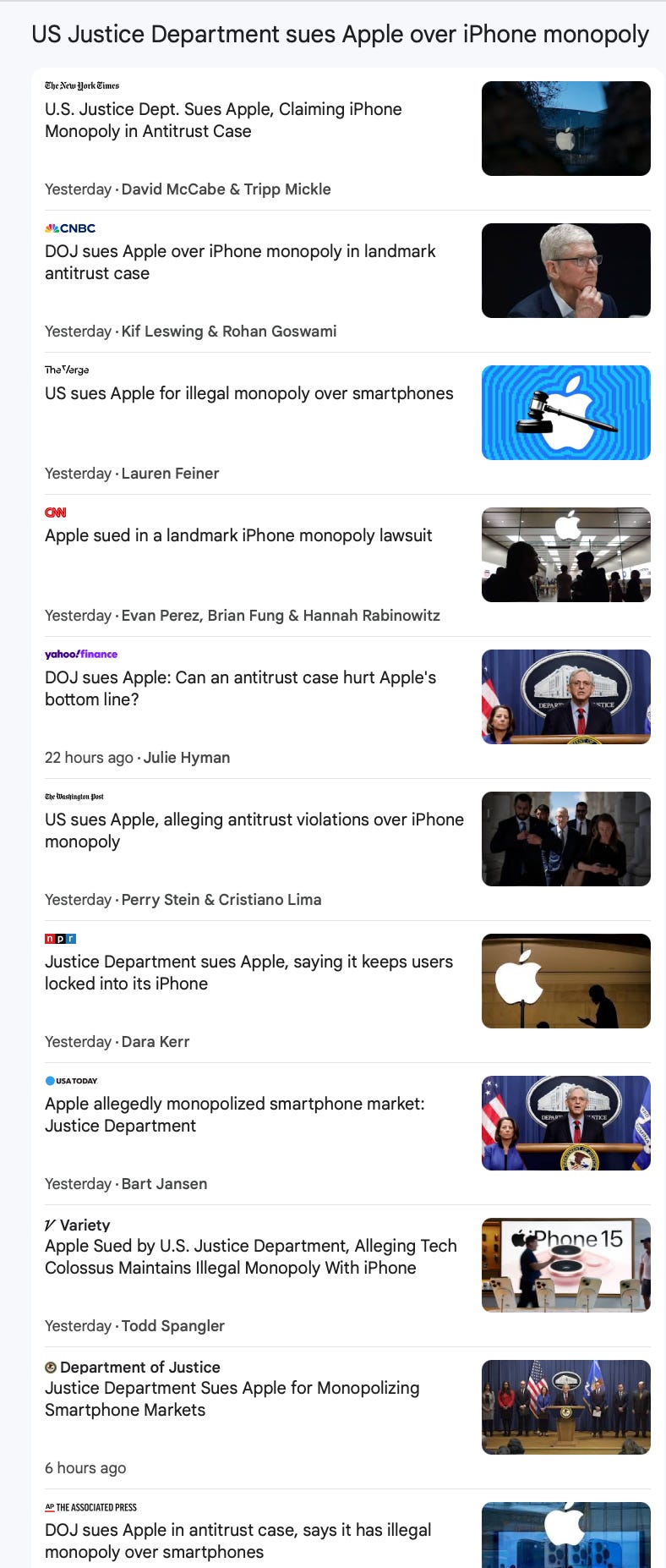
I wrote a long twitter thread starting here. This post has that thread below and I’ve also summarized here.
Many will wonder if this is like the Microsoft case because we look for a frame of reference to compare and most giant antitrust cases that go to trial are once in a generation events. The cases have similarities but the facts and context are unique, just as Microsoft’s case was not like AT&T, which was not like IBM, which was not like Standard Oil. These once-in-a-generation cases also define the careers of litigators and regulators, not to mention law students aspiring to someday land a giant case. There is no bigger target than today’s Apple. When huge the AT&T breakup happened we had a guest speaker in AP Social Studies in 1983 who worked on the case. It was wild to learn he spent almost his entire career on the case that had started 12 years earlier. Attorneys inside Microsoft were hired from law school to work on our case and retired from Microsoft having worked only on that case. Still, the law is based on precedent and by definition what happened before plays a critical part in every case even if fact patterns differ.
Microsoft had 90% or more of the PC market. We can debate how permanent that would have been. History showed Microsoft to be 100% correct in its assessment of the technology industry, as we sit here today with the PC and PC servers the old market, Office a massive but uninteresting business, and the internet winners a whole new generation of companies. That fragility of technology leadership not only applies to Apple but is deeply engrained in their own experience as the original leaders in the PC. Unlike Windows, not only is Apple’s position in the mobile phone market not a monopoly or even grossly dominant share, the DOJ even has to stretch to define a “performance smartphones” market segment to increase Apple’s share. Antitrust is not immune to duopolies2 but doing so in the face of a fragile and easily switchable technology industry is a different gamble, than say natural resources.
Like the Microsoft case, however, this case was filed on what is clearly the tail-end of the innovation and adoption curves for smartphones. From an innovation perspective that is literally the dumbest time to file a case because little will change with phones while the court is trying to figure out how to fix phones, but outside of phones the world will change enormously. The world is moving on to AI, glasses, and new devices. While the Microsoft case was being litigated the cloud, mobile, tablets, ARM, GPUs, and more rose to prominence, none of which were part of the case. All of which were varying challenges for Microsoft that had little to do with Windows and definitely don’t today.
There are two sets of claims in the filing. The first set are written as a narrative for laypeople. The claims are broad and kind of all over the map. Before listing the specifics there is a lot of language and froth about how Apple uses its place in the market. This is the “story.” It is very exciting to read but you have to get to the actual behavior, which the DOJ claims is that “Apple has used one or both mechanisms (control of app distribution or control of APIs) to suppress the following technologies, among others” which includes:
“Supressing Super apps”
“Supressing cloud streaming game apps”
“[P]rohibiting third-party apps from sending or receiving carrier-based messages”
“[S]uppressing key functions of third-party smartwatches”
“[D]enied users access to digital wallets”
Wow that looks awful. That is the point. The problem is for the case that uniformly all of these are product choices that are entirely consistent not only with what other companies do (like Google’s Android + Samsung) but also with Apple’s own history. A key part of US antitrust law that the DOJ has to overcome is not just to prove Apple has a monopoly, but that it acted illegally to maintain the monopoly. When a company has consistent behavior as it rose from 0% to 50% share, the burden will be on the DOJ to argue that the same behavior is now anticompetitive in a specific legal sense. In other words, a lot of what the DOJ will be arguing is that product choices Apple clearly made to up-level the iPhone offering in terms of security, privacy, reliability, battery life, and more since the introduction of the App Store when the phone was at 10% share are today anticompetitive. The existence of another type of smartphone or ideas for how another type of smartphone should be ideally designed is not enough to prove Apple is being anticompetitive. These design points are not about what you might do today, but what Apple has been doing since inception of their products.
This history will be front and center as the DOJ makes a case to turn the iPhone that customers chose and love into an entirely different product, just as the EU is already doing. One need only read and watch Steve Jobs discussing the role of Adobe Flash on iPhone, something that many believed if absent would doom the iPhone at a time when iPhone had about 15% market share. In his 2010 All Things D interview with legendary Walt Mossberg, Steve Jobs specifically outlined the precise rationale for why they would not support Adobe Flash, a runtime or in the DOJ vernacular a Super App platform. This interview was an articulation of the memo Thoughts on Flash. One could generalize this when it comes to include any compute runtime—all from the very start of iPhone.
One of the biggest flaws with this case is presuming that phones are PCs, and that Apple should have built a PC-like operating system, meaning that a phone should just be a PC when it comes to installing software and enabling access to devices and the workings of the OS. This is a technically illiterate position to take. Dumb too. It ignores the progress of abstraction, the heart and soul of computing. Much of this argument falls apart as the complaint even claims that Apple knows what to do since it did so on Mac. It is so dumb I won’t even quote the filing to spare embarrassing DOJ further. Perhaps people are confused because Apple used a PC OS as the foundation of iPhone, but as we all know software always has capabilities that are not made available from one layer to the next. That’s the whole point of abstraction.
To those that think they know what to do today, I get that. I built products too. But Apple chose to build a product a different way. It blows my mind this is being debated at all. Companies make product choices and the market decides even when they have 0% share and even when people disagree in hindsight.
The complaint is at once saying that Apple should have made its own phone to be just like its Mac and also that it should be like Android, failing to even recognize that the iPhone is a philosophical and technical successor to Mac that incorporated lessons from Mac, even if it is based on architectural history and code of Mac. This presumes that the market has no interest in supporting alternate models of product development and in particular ignores everything and every behavior Apple has demonstrated in how the iPhone came to be. It is pure ignorance of product development.
A key part of antitrust is whether a company has acted consistently. If a company grew market share and obtained a monopoly by doing things legally that is not enough to be illegal. The company must do bad things to maintain a monopoly if it didn’t do bad things to earn one. Obviously I am not writing a law school textbook here.
This initial filing conveniently ignores the epic loss in the Epic v Apple case where the judge ruled:
“While the Court finds that Apple enjoys considerable market share of over 55% and extraordinarily high profit margins, these factors alone do not show antitrust conduct. Success is not illegal. The final trial record did not include evidence of other critical factors, such as barriers to entry and conduct decreasing output or decreasing innovation in the relevant market. The Court does not find that it is impossible; only that Epic Games failed in its burden to demonstrate Apple is an illegal monopolist.”
But even if you believe the Judge above was wrong, this does not mean all products need to converge to the operating system model deployed by Microsoft in 1981. In fact, the case is super confusing about whether the target is the iPhone or iOS or a combination and conveniently switches between those when it suits them, nor is it clear if the competition is Google hardware with Android, Samsung hardware and enhanced Android, or Android in general. The very fact that Apple iPhone is highly differentiated in market by selling a combination of hardware and software that cannot be picked apart by consumers is itself a unique market offering compared to Android which by design is an operating system that can be picked apart and used by a variety of hardware makers including Google itself. This is highly material as it shows the market if functioning and supporting two wildly different business and product models, and of course except for the narrowed definition employed on purpose, Google Android actually has a higher share. To this end the judge ruled in the Epic v Apple case:
It is this interbrand competition that “the antitrust laws are designed primarily to protect.” Id. at 895. Here, centralized app distribution and the “walled garden” approach differentiates Apple from Google. That distinction ultimately increases consumer choice by allowing users who value open distribution to purchase Android devices, while those who value security and the protection of a “walled garden” to purchase iOS devices. This, too, is a legitimate procompetitive justification.
Even so this is the narrative the DOJ and States employed—Apple is a closed system that has a monopoly and protects that monopoly, stifles innovation, and raises prices by not opening itself up. The filing leaves plenty of room for other charges to come along. The actual legal violation then takes these five perceived technical problems and delineates how they violate the Sherman Antitrust Act. The core of the complaint repeats the following:
Apple’s anticompetitive acts include, but are not limited to, its contractual restrictions against app creation, distribution, and access to APIs that have impeded apps and technologies including, but not limited to, super apps, cloud streaming, messaging, wearables, and digital wallets.
It is noteworthy how the language shifted to “cloud streaming” and “messaging” which are both broader than the initial claim. This is probably at least in part sloppy but it is also the kind of obfuscation done when trying to elevate the claims. The law is very specific and this matters because settlements and justice hinge on specifics not breathless claims.
The following is repeated for legal reasons to apply in different legal scenarios, but the facts are the same for all of them.
Apple has willfully monopolized the performance smartphone market in the United States through an exclusionary course of conduct and the anticompetitive acts described herein.
The way these filings work is that the conclusion is a request for relief. This is kind of where most of the recent history has shown these cases to go wild. In the Microsoft case this is where “break up Microsoft into the OS company and Apps” company came from. This wasn’t in the filing, which was very specific about Internet Explorer, OEMs, and licensing. You can read so here. The insanity came later but started with the punditry right away.
The craziness of this “meme” was that the case was not at all about Apps and was clearly about Internet Explorer, OS APIs, and the relationship between Windows and PC makers. But somehow this type of structural relief was all the rage at the moment. This is easy to see because the generation of antitrust lawyers on the case came of age during the AT&T antitrust case and structural relief was the answer of the day.
After all that smoke, where’s the fire? Well, it turns out it is pretty mundane stuff. The DOJ just wants to redesign the iPhone to be like Android or a PC. In this present case the plaintiffs are specifically requesting that the court enjoin Apple from the following:
a. using its control of app distribution to undermine cross-platform technologies such as super apps and cloud streaming apps, among others;
b. using private APIs to undermine cross- platform technologies like messaging, smartwatches, and digital wallets, among others; and
c. using the terms and conditions of its contracts with developers, accessory makers, consumers, or others to obtain, maintain, extend, or entrench a monopoly.
Very quickly this gets the claims that look a lot like the Microsoft case. Much of where Internet Explorer was litigated was based on the idea of “middleware” (Java, browser, media playback) that Microsoft was competing with. As with this case, the notion of middleware is important because “devalues” the defendants product and it is viewed as something defendants fight against inappropriately for those reasons. However, please see Thoughts on Flash for the actual consumer reasons.
Using “app distribution to undermine…” is a view that phones should be like PCs. This is completely and utterly ignorant of the unique market offering that is iPhone and ignores any notion of the evolution of technology. I was searching for an analogy but somehow it seems like forcing car makers to sell cars without airbags because there’s an airbag duopoly. Cars and people have evolved, and airbags are a requirement. There’s no going back. This seems to be people that read about the old Microsoft case in law school and tried to apply the same.
But geezus, “private APIs” was the boogeyman in the Windows case and proved utter nonsense. At least with this case there are clearly APIs available only to Apple, but we only know this because Android has a different view of APIs. This entire idea gets into very subtle conversations about what is in the “OS” or “platform” and what are applications. This is the same dumbness we faced with Internet Explorer (or Media playback and formats) and Windows which led to the infamous (and failure on Microsoft’s part) of “can you remove IE from Windows?” moment. Yes, but why? And here we are today where no OS exists without a browser. The only difference today is that everything that one might view as an “app” on the iPhone also exists on Android. So literally this is not a theory but proof of two significantly different approaches in the market, which is exactly what the legal system should want and what the judge in the Epic v Apple case pointed out.
What the DOJ is trying to do is turn the iPhone into Android, which is exactly what the marketplace does not want. Just as the DOJ tried to remove a browser from Windows which was exactly what the marketplace did not need to happen.
You can see shades of this same technology argument in this week’s where the filing simply claims “In the end, Apple deploys privacy and security justifications as an elastic shield that can stretch or contract to serve Apple's financial and business interests.” This is complete bullshit and offensive to the people that work so hard to make this legitimately provable claim. This is a way for DOJ to claim anytime Apple says something for security the response will be that is just a shield and not a legitimate goal” just as every time Microsoft pointed out that operating systems integrate new technology the DOJ said that was “bundling” and not just what operating systems do.
The whole problem for Apple with “private APIs” is that it is obvious there are APIs and that means it is obvious you just make them un-private. I mean we can see they exist. This is nothing more than simple “product design by courts.” As everyone who has built software knows, it is a layered approach, and you don’t publish everything at every layer. Importantly, you can’t just publish a layer in the middle and cross your fingers. You can’t bring your own ingredients to a restaurant and force them on the chef and then get angry when the meal is awful. The right of software to have “implementation details” is real and the right for a product to define which parts are exposed to developers and which parts are not is perfectly valid, even though it is always easy to imagine exposing everything. This too is a different approach that Apple has taken in the market and should most obviously be recognized by the courts as precisely what the market is good at figuring out, certainly better than courts and way way better than asking other computer professionals to break abstractions to make their jobs easier. The line between a platform and an app is no clearer today than it was in 1994 or 1998 when that was argued against Microsoft.
As with the Microsoft case, I suspect almost all the battles will end up being about the third point, the terms and conditions of contracts which is the stuff lawyers and courts are good at, and not on product design which the courts have routinely balked at or done a very poor job just as we see in the EU today. In this case, Epic v Apple will serve as a lot of precedent as many of these same terms were litigated already, all the way to the Supreme Court. The vast majority of the settlement in the Microsoft case ended up being terms and conditions licensing Windows. How that evolves in this case will depends on many factors and a lot of time.
The case is poorly written as a general rule. There are more basic factual errors than one would see in a senior college paper written the night before. The description of how the US v Microsoft case paved the way for iPod on Windows was entirely incorrect. The theory on why the Amazon Fire phone failed was laughable. These don’t really matter but serve to undermine the quality of the case presented. It is fascinating that after 75 pages of huffing and puffing, the actual complaints are so mundane and recycled when they clearly don’t apply.
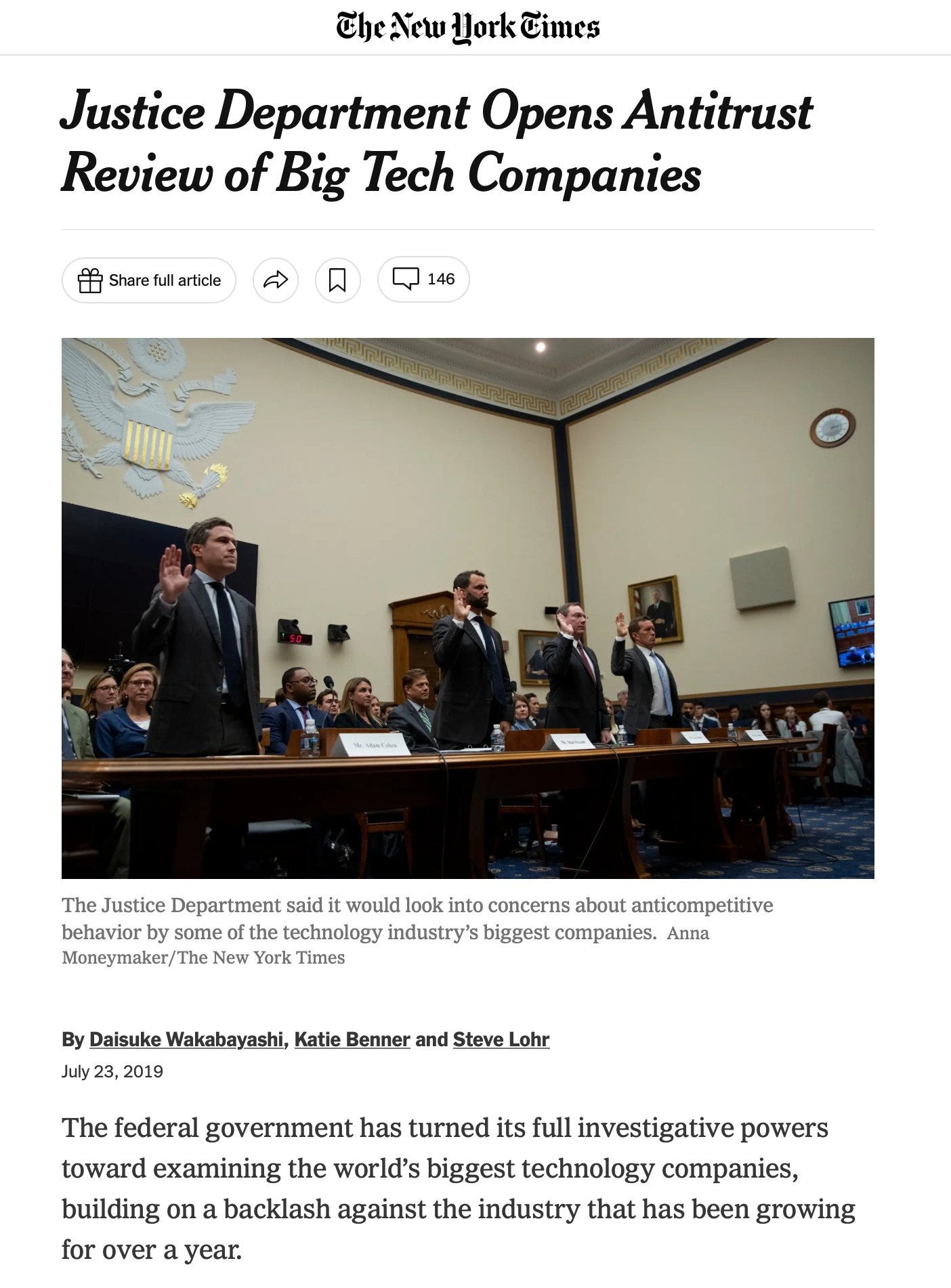
In the end, this is clearly a political case. The DOJ set out in 2019 (!) in the before times to “go after Big Tech”. The DOJ is just like at a big company when you make something a performance review goal you’re going to get it, no matter what. The DOJ set out to bring cases against “Big Tech” so that’s what we got. Here we are with the case against Apple. It is weak and poorly framed and looks to me a lot like they could not figure out what to do with an obvious duopoly where the market is being incredibly well-served by two very different approaches, a lot of happy customers, and few loud and vocal companies complaining who already lost in court once. There’s no shortage of variety, innovation, or utility. The ecosystems are vibrant. Most of all consumer choice is incredible and prices are, well, FREE!…at least with a 12-month contract. iPhones are $100 at WalMart or $10/month with a plan. And that’s before talking about the capability of these products. INCREDIBLE!
Some claim the DOJ is above these partisan politics because the war being waged against big tech spans administrations. It is true the Microsoft case was filed when Bill Clinton was President and Bill Gates and Bill Clinton were not strangers. At the same time, as the head Microsoft lawyer once told me, the career antitrust attorneys in DOJ didn’t specialize in the area and take a government salary to not take on the big targets. They are going to find a reason to do that. The ability and support to do so waxes and wanes with administrations but they are always there and in this case for entirely different reasons both sides of the aisle had a lot of interest in going after all the major technology players.
Ultimately there are two things I think worth watching:
The antitrust community in the US has longed to expand the basis for case law beyond what it is today. Keep in mind they are antitrust lawyers, not community business leaders. In The Antitrust Paradox by Robert Bork, the canon of antitrust law was documented which is that in the US law exists to protect consumers. The market will dispense with companies and competitors so long as consumers are protected, basically. While no doubt some tech enthusiasts in the US want the iPhone to be like a PC, the 90% case is not only do they not want that, but they are paying Apple for that not to happen in the face of the Android duopoly. In Europe, which has recently had a much more aggressive antitrust program and by many accounts is now the leader, the modus operandi is that it is the competitive marketplace and choice and specifically competitors that need to be protected. Many in the US would like to get out in front of the EU and that means protecting competitors. US law currently doesn’t support that and historically has proven backward looking, especially in technology. Changing laws is difficult. It is much better to attempt to win cases and legislate from case law which is what this is all about.
The case is broad and ill-defined at present with a mixture of both complaints and remedies, so where will it lead. The case will get narrowed over time as a matter of course. In general, at least what is said, US courts do not like to delve into product design and prefer behavioral and structural remedies rather than picking and choosing winning products or product approaches. That was why the quick leap to “break up Microsoft” got exciting as a structural remedy which was all the rage after breaking up AT&T. No one is expecting Apple to be broken up into anything. So the question will likely turn into specific policies and verifying those. But as the DOJ learned (maybe?) with the US v Microsoft these types of remedies are quickly moot in the market as all players rapidly adjust and technology moves forward. There is some residual bitterness there that comes with the absurd claims of how the case tamed Microsoft. The mess they made of PCs with “set programs and defaults” is kind of legendary at this point. In addition, I believe many of the initial claims have already been litigated and how that is dealt with will be important. I suspect there will be lots of early legal work on making the case coherent while also reminding the court that the facts have been litigated.
Mostly at this point my heart goes out for all the people at Apple who have worked so hard and built such market-defining and market-leading products. Right now, I know the emotions they are experiencing, deeply. They feel like they did something wrong. Soon relatives will be asking what is going on and will have tough questions at Passover and Easter family gatherings. People will feel bad that their own government is saying their product is violating the law. You deserve better. Everyone worked too hard. The products are too good and defined a generation. Stay true. The biggest advice (if I could) offer is stay true. Don’t change anything now. You do not have to. Products change when the case ends, and only if you lose parts or settle the case. The way to mess up now is to act as though you’re guilty of something. You are not.
Though concretely, don’t say dumb things in email. That is always a pain in the ass.3
In the meantime, expect the DOJ, competitors, and most of the press to keep pounding on the table.
To people saying that I’m sort of Apple fan or traitor or whatever, stop. I am just someone that has lived the pain and pointlessness of what Apple has to go through now. I say that knowing Microsoft did some dumb stuff, but the price paid was way too high and the end consumer benefit zero to negative.
The following is a lightly edited version of the X thread posted on March 21, 2024.
Today the US DOJ+16 states/DC (HA we had 19+) filed suit against Apple over abuse of market position ̷b̷y̷ ̷m̷a̷k̷i̷n̷g̷ ̷a̷ ̷v̷a̷s̷t̷l̷y̷ ̷b̷e̷t̷t̷e̷r̷ ̷c̷o̷m̷p̷u̷t̷e̷r̷ in an effort to keep customers reliant on iPhone.
1. This is scary/concerning/freaky if you work at Apple. My first thoughts go to them. What I can say is heads down, be patient. It’s an ultramarathon.
2. If you are a competitor cheering then history tells us down the road you will either become a faded memory or will be sued.
Of course I am not a lawyer and don’t pretend to be one, but I spent a couple of decades mired in this world. When the Microsoft case first started in the early 90s. MS’s GC said to me “you have to remember, people who chose to practice antitrust (AT) law not only believe in it but see ‘monopolies’ and ‘abuse’ everywhere.” It is very important not to lose sight of this reality—career antitrust professionals either defend companies or work for the government and prosecute them.
Right now the first filing is “shots fired” and all about creating the narrative. It is tempting to evaluate a case on merits and to pick sides. Except the problem is antitrust people already picked their side. It is also the case that many stories will tell the tales of successfully antitrust efforts *like the MS case*. Good grief.
Apple has yet to defend itself. Few people speak out in favor of defendants at this time. You will hardly see anyone in the commentator-class speaking against the case. THIS IS IMPORTANT TO KEEP IN MIND.
The people commenting will talk about how AT caused Microsoft to lose the browser war or fail in mobile. Those are 100% false. The biggest impact on AT was to make Windows worse for consumers.
Intel’s efforts at defending itself against AT are an even better example. AT efforts hobbled the innovation in x86 and forced Intel into doing a ton of artificial things — “MMX” anyone? While also trapping them from failing to act when AMD acquired ATI, or to embrace more efforts at discrete graphics. In hindsight the fact that the Government is pumping $10B into Intel puts a price on how much that AT effort cost.
I sat down to read the complaint and my first thoughts were:
Let’s see the salacious email examples
How will they define the market
What was the consumer harm and/or what remedies are sought
I will be reading for these.
And as you saw the case opened w/an email to Jobs about iMessage and Android. Good grief. https://www.justice.gov/opa/media/1344546
If this ever goes to trial you can bet that this case will distill down to a single-digit number of emails (there were ~3 memorable ones in the MS case, IMO) or worse internal chat posts or Messages, even with thousands of exhibits. Imagine if you will the millions of records they have. Millions.
When it comes to “consumer harm” this has been the bedrock of US AT law for decades. In his standard-defining book Robert Bork outlines this history.
Today, AT professionals are essentially bored with this and want to expand it to competitor harm. This has been an agenda for democrats for decades. That’s why the Amazon case is such a big deal to FTC (DOJ and FTC take turns or divide up cases)—Amazon has tons of competition, vast amounts, but they are big and the AT lens says big companies abuse their position and hurt competitors and so antitrust law should be there to protect competitors, which is how EU law works. The Google case faces similar hurdles.
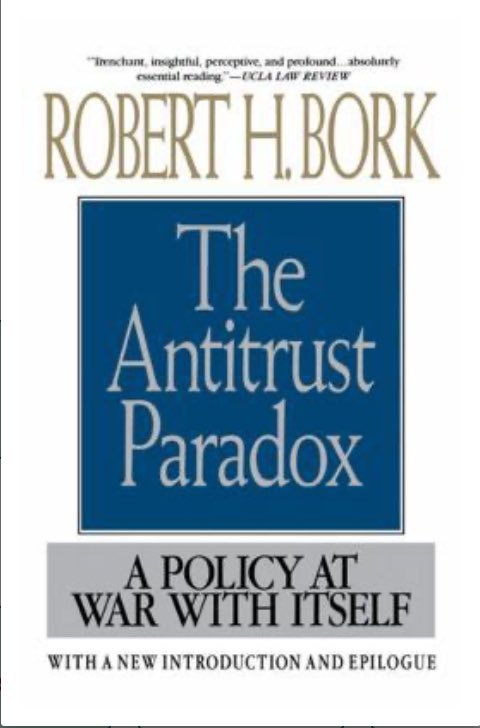
Apple has just over half the share of phones in the US, with Android having the rest. This has been stable for about a decade.
So, the question is has Apple prevented people from switching to Android or is it consumer preference.
“Threats” “shapeshifting rules” “restrictions” are also other words for negotiating, adapting, security/privacy/reliability/battery life/etc.
Also “just over half” is tenuous “dominance”.
Note that many of these arguments already failed in the Epic v Apple case, which hasn’t stopped Epic from complaining. Every case like this has one company leader that serves as the lightning rod for the loud and colorful language aimed at the defendant.
There are juicy paragraphs that make no technical sense like the above.
Of course you can do that today. Amazon built a whole platform for this.
This more than anything gets to the deepest irony of this case. It a case about Apple’s smartphone just as there is broad recognition that the smartphone while hardly at a nadir, is past peak innovation.
“Unless Apple's anticompetitive and exclusionary conduct is stopped, it will likely extend and entrench its iPhone monopoly to other markets and parts of the economy. For example, Apple is rapidly expanding its influence and growing its power in the automotive, content creation and entertainment, and financial services industries…”
Have they seen the news? Cars failed. AppleCard a mess. Apple TV is not Netflix or Google TV.
This “bundling” view of competition was used against Microsoft as well. It has always been a complete misunderstanding of how software platforms work and the difference between winning with a bundle that appeals to distribution and winning with a better product. This also ignores the giant sucking sound that is a software platform that consumes layers of software above and below as a matter of course. Otherwise today when you bought Windows all it would do would respond to loading a tape and flipping switches on a console.
Apple has aspects of how they integrate their products that provide huge benefits to consumers and in most every case those benefits are available to third parties. Most third parties do not want to build those same products as Apple *because* they don’t want to rely on Apple’s platform. So in most cases what is going on is that Apple has success simply because others want to exploit consumers in their own way. It is not so straight forward that this is a one-way thing.
“This case is about freeing smartphone markets from Apple's anticompetitive and exclusionary conduct and restoring competition to lower smartphone prices for consumers , reducing fees for developers, and preserving innovation for the future.”
Filing does not mention how much AT&T paid to Apple. Again not understanding the basics of business. Lawyers hate when business and product people say that something misunderstands them and they tend to say that we don’t understand the law. In this case, this is a very basic misunderstanding how the original iPhone was priced, and not a secret but wildly discussed. Steve Ballmer’s famous quote about iPhone pricing even mentioned “before subsidy.”
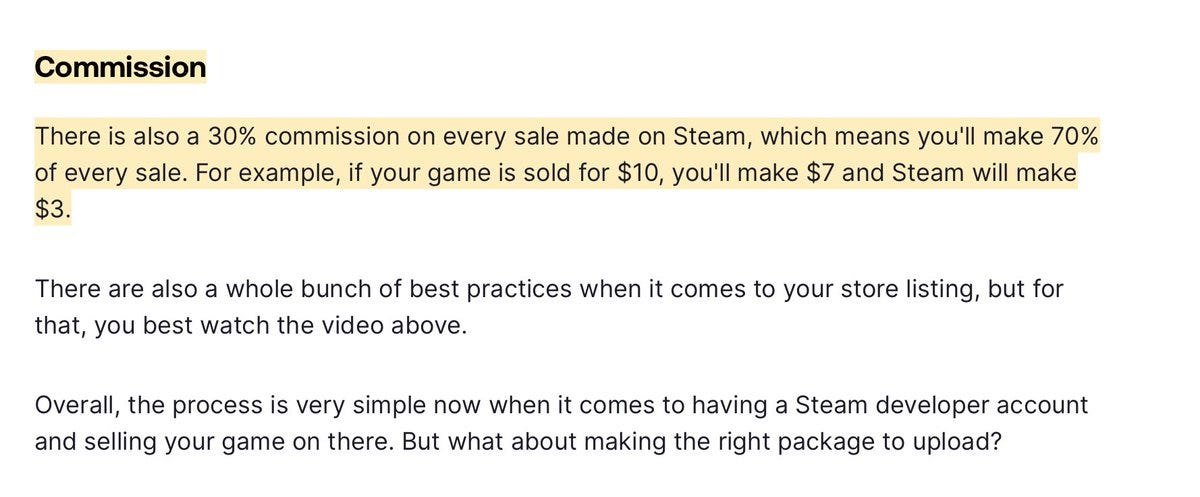
Just out of the gate proving they do not understand the market. A simple read of history would show this below is *not* why or how Apple struggled.
“From its inception, Apple had a knack for expensive, high-end design and niche marketing relative to its competitors. But it struggled to compete against rivals that offered lower prices and more programs. After two decades, Apple struggled to compete against Windows personal computers and by the late 1990s, it was on the brink of bankruptcy.”
The highlight below is patently FALSE. Microsoft begged and pleaded for Apple to make iTunes available on Windows. The debate inside Apple about going to Windows is well-documented and establish by the people who debated.
How can you take this case seriously? This is how AT people claim AT is a huge benefit. They just make stuff up.
Notice there is no discussion of the enormous consumer benefit and love of the iPod. No discussion how it saved the music industry from piracy. No discussion of how it made the world’s music available in your pocket. NONE.
This is just 100% timeline fraud and gaslighting.
So now they will use emails as exhibits that the speaker is not around to defend themself. Good grief.
Also again note that the development of the App Store was also controversial because Apple prioritized safety and security. The debate internally is also well-documented. I doubt those exhibits will be raised by the governments.
“Demands” “extracts”
Wait until they learn how products show up at WalMart on the shelves.
This is the most incredible argument. Somehow because you can’t instantly switch to Android it slows down innovation in SmartPhones. First, many reviewers see the iPhone as more innovative as it has consistently won in many areas that are reviewed. Second, the Android half or more of the market seems to be doing just fine . There are gymnastics in the complaint to narrow the smartphone market to only the places with Apple price points which is disingenuous since they also point out Apple is expensive. In fact most data has shown people switch to iPhone. Oh, and did they try switching from Android?

Literally what makes the iPhone what it is—people are there to have someone responsible to help in the evil world of online safety, financial fraud, and more.
In the Epic v Apple case, the judge specifically made a point in the ruling of explaining how the presence two very different approaches is precisely what the market is about.
The complaint hinges on 5 specific types of apps that Apple restricts that would have increased competition in smartphones. On the face of it this doesn’t make sense as it would have increased competition in these apps not in phones themselves. The apps are:
Super Apps
Cloud gaming
Messaging
Watches
Wallets
The naming above is mine but the filing starts with specific naming, changes words around, and then as the filing gets to the end the wording is broadened. This is an intentional tactic and also plain sloppy for a profession where words matter.
The amazing thing is how vibrant all of these are today. It is just puzzling what this is about except for large incumbents with margin challenges looking to not pay Apple for delivering safe, reliable, frictionless customers on a platter. It is decidedly not about innovation.
“Apple also prohibits the creation and use of alternative appstores curated to reflect a consumer's preferences with respect to security, privacy, or other values.”
In the middle they just toss in alternative app stores and unlike EU they just come out and say Apple should offer insecure, privacy, valueless stores.
I can’t even.
Here’s the mail. They quote Steve out of context and imply he is talking about something that happened. Of course they intentionally do this in this part of the filing because it is not evidence but narrative like an opening argument. I find it distasteful that they use Steve Jobs quotes knowing he won’t be deposed.
“Apple's smartphone monopoly means that it is not economically viable to invest in building some apps, like digital wallets, because they cannot reach iPhone users.”
Somehow it is not economically viable to address half the market. How many iPhone-only apps will Apple need to demonstrate to make the counter-point? Are there no Android-only apps that Apple should complain about?
The fallacy of cross-platform on mobile has always been that you can have one code base and use middleware to target both/multiple platforms. As we all know, we generally hate these apps. This is not new. Cross-platform has never worked well at scale. The reason is that the platforms wake up every morning trying to make cross-platform difficult. It drives me bonkers that big competitors and DOJ have refused to acknowledge this for decades upon decades. Here’s a post I write ages ago, Divergent: Thoughts on Cross-Platform (Updated)
More technical nonsense. Blame Apple for SMS. Good grief.
The filing is very confused about what the platform is. This is similar to what we experienced in the Windows case. Is it APIs? Is it the end-user experience? And in Apple's case is it the hardware? The excerpts below show this confusion.
I suspect the case is confused because so much of the institutional knowledge and political desire is to go after the software industry and so much of that is rooted in the idea of singular platforms with control over developers, the Microsoft case.
Unfortunately for that, with an iPhone the platform is both the hardware and software. This will be used one way when talking about competitors (eg dominant share) but entirely the other way when talking about developers. While I would complain about the DOJ using Steve Jobs quotes, I would be remiss if I did not include this one:
We’re the only company that owns the whole widget – the hardware, the software and the operating system. We can take full responsibility for the user experience. We can do things that the other guys can’t do. —Steve Jobs
This actually matters because when you seek a remedy you have to consider what it is that is being fixed. So here the platform is the OS, but Apple is a hardware company too. It is also the reality that services are just software and just like software there are a bunch of those features that will exist on every platform in some form or competitive flavor or another. As an example, every mobile platform today has payments. That isn’t the issue. It is worth looking at the Microsoft filing to see a more thoughtful view of the relief being sought.
The second one is clearly about software being disruptive.
The third is some weird notion of what consumers care about. Note credit card companies would like a word over what people care about, hint it isn't transactions.
I keep returning to this last point -- Apple resists technologies. Antitrust law doesn't make it illegal to make dumb choices. If a new technology is compelling it get adopted first on Android (or Linux for that matter, as we've seen in XR, glasses, pins). And this idea it keeps iPhones expensive is non-sensical not to mention easily observed by watching the Super Bowl ads.
The documents that DOJ already has will show Apple was debating whether to have apps at all. Why? Because of concerns over how people will exploit the platform and risk security and privacy, and battery life. See "Thoughts on Flash" and see "I'm a Mac" tv commercials. The whole concept of curated apps and platform definition to include h/w, software, store ignores the idea of upleveling technology the same as EU has done. This is rear view mirror regulation. They are also being selective in the evidence which is normal at this point and Apple will have an opportunity to tell the other side of this story, with their own emails.
How does Apple drive people away?
What is a monopoly rent if the price went gone down as the platform became more popular? Why is Android's take the same? Why is Sony's on PlayStation? Does anyone think Unity/Unreal like their store fees or do they feel they messed up by making them too low or maybe they are low because they don’t add the amount of value Apple and Google do with phone stores?
As you keep reading this is getting more sloppy. What's a "subset of developers" v "app maker"? Last I checked only the government has taxes.
Have they used an Android phone? Has anyone tried to get their photos of Google? Can you even move your Google docs anywhere? Have you tried to export your saved maps? The list is endless and Google has higher share.
Please read "Thoughts on Flash" as it could not be clearer why Apple did what it did. And this was before the iPad and long before PWAs or large smartphone share. Apple had less than 15% share when it drew the line at these runtimes. Yes it is the case that behavior is different when there is large share and if anything Apple is far more lax today with HTML and other extensions to single apps.
Other than saying super apps have less stuff in their store this makes no sense at all. I can imagine the lawyers sitting on Zoom getting all excited by the phrase “Super Apps” and the idea Apple blocks them, just like every time someone said “standards” and assumed Microsoft hated standards. Blocking something “super” seems really anti-consumer which is obviously why this is mentioned. That policies might differ in China is only a bonus. It isn’t about law but what narrative feels better. If one were to get DOJ to really prioritize the value of these 5 areas when it comes to impact they hope to achieve there’s no way Super Apps would be first.
This is probably one email for this entire point.
A key part of Apple's brand promise is child safety. The streaming platforms are used by many under 18 or under 16 and are notorious for lax to no enforcement of standards and for inviting use to in-app purchasing to bypass parental controls. Essentially DOJ is arguing against having those capabilities on iPhone.
The EU is currently figuring out the problems they are creating in pushing this agenda.
Imagine a world where a company should be forced to provide its service for a competitor when there are a multitude of services that can be used a click away and in fact are used by 5-10x the number people already.
Apple's success in China and Europe speak to the success of alternate messaging platforms on the iPhone.
Nowhere is there any view that Google should do a better job providing stuff for iOS. I for one would love DOJ to step in and redesign Google Calendar so it works like a real iOS App given their share of calendaring.
This is a lot of words to talk about opening up NFC which has a host of challenges. OTOH Square, a company that did not even exist before iPhone, managed to become a $50B payments business without API access by simply using the audio connection. Venmo and PayPal have both benefitted enormously from iPhone without struggling.
One of the challenges with using competitors as the proxy for consumers is that competitors go to DOJ and say what they want but what they want is always to gain advantages over each other with the least friction to their own work. This is a never-ending debate.
We saw this a ton in the Windows case because at the root of the case were OEM rights. Amazingly the settlement required us to have precisely uniform terms for each OEM which they HATED because then there was no way to have something as simple as a cool bizdev deal tied to a new type of PC or a volume discount for the biggest customers. As many learned with the EU, be careful what you ask for because you might not like how it gets expressed.
So even if there is access to APIs the competitors to each other hate level playing fields and will find that to complain about.
Android did payments first. It was their idea not to charge and had nothing to do with Apple. Apple entered the market charging which says something about the quality of the capability and desire for companies to partner with them. It is similar to MFI and hardware -- google did not think of defining standards and maintaining them for hardware accessories for Android. So there's nothing to enforce and no business case and hit or miss when you buy accessories.
One of the most striking aspects of this complaint is the idea that Apple has recently developed all the issues complained about in an effort to maintain "monopoly."
This is not the history of the phone or design choices or even Apple itself. The "playbook" (using their words) for Apple has been essentially unchanged since 1984. All that has changed is the increasing quality of the experience as the industry has grown up.
This is another example of not giving credence to what Apple already does. For example with house keys in HomeKit by using HomeKit keys are part of a Home, shared across users, managed across devices, etc. Regardless of how many brands of locks one has. Failing to even acknowledge the benefits Apple brings is irksome.
This reminds me of EU thinking we need to make Windows default device drivers pluggable so that a printer company can be sure to sell ink rather than avoid zero days.
Apple is going to dominate the auto industry with CarPlay and keys. Have they not kept up with Bloomberg on Apple CAR?
To show how confused the DOJ is about hardware v. software they say this:
"Apple's conduct has resulted in less choice for smartphone users. Today, only two companies (Google and Samsung) remain as meaningful competitors to Apple in the premium smartphone market."
Google is not a meaningful maker of Smartphones.
Samsung is not a meaningful maker of smartphone operating systems.
So which is it? Also "premium smartphone" is a tell that further down they will start to define the market in a funky way, "premium" is all that matters.
The other companies they might refer to, Blackberry, Amazon, Nokia, Microsoft all went out of business in their unique and well-documented ways having nothing to do with Apple doing stuff to them.
The continued emphasis on cross-platform says this is about the software and assumes the PC model for hardware. This doesn't make any sense. The market is for Android compatible phones not phones lacking an operating system.
Apple literally defined the iPhone App Store from a start to resist runtimes. Steve Jobs explained all of this with respect to Flash when iPhone had <15% share.
This makes no sense still after reading this same claim the third time. Apple is making its product better by not supporting these things and more people use the phone because it is better because battery life, security, privacy, control of credit cards, child safety, and more are better.
In this case the DOJ is assuming better is Android. If Android is better then more people would use it as is the case around the world in total.
Is there a car that only has CarPlay?
THIS IS SO WRONG. This presumes that the right model for smartphones is the PC model. Please please go watch I'm a Mac commercials. When was the last time someone ran antivirus software on their iPhone or blue screened?
What this claim does is fail to recognize innovation. Insane.
Also discovery will show they tried to get the Mac store to be like the iPhone App Store.
This is key. What they are saying is that they will find the right market later and do so based on whatever Apple says and whatever they can find a consulting economist to say.
But to be clear if we define the market to include only where Apple sells phones then Apple is winning there.
OTOH Walmart sells iPhones and wouldn't that by most economic definitions include entry level. This is going to be a debate over phones that are $89 v $129 or $19/month v 29/month?
But this whole case is defined to be not Android v. Apple but only some Android phones (Samsung and Google?) v Apple even though the consumer of other Android phones are exactly equivalent in terms of the developer endpoint or the consumer using apps.
Apple's monopoly caused these phones to fail.
A good deal of the relief sought is based on the desire to make it so there is no phone platform but just middleware. This is almost certainly momentum from the US case where middleware became known to legal circles. The irony is that was all about Java which completely failed for all the obvious technical reasons it would fail.
The fact that there are two middleware solutions for games shows the complete fallacy in the idea "there can be only one". Instead we'll all just get tons of crappy apps that each do their own take on "operating system". If you want more on the mistake of cross-platform development check this out ->
Divergent: Thoughts on Cross-Platform (Updated) Targeting multiple operating systems has been an industry goal or non-goal depending on your perspective since some of the earliest days of…
Also this podcast on cross platform with Benedict Evans and I.
Cross platform just doesn't work and it is technically criminal for the DOJ to base a whole case strategy on thinking that is what developers should do.
a16z Podcast: The Promise (and Nightmare) of Cross-Platform Software | Andreessen HorowitzThe announcement by Apple of its new programming language Swift is prompting developers to consider yet again how to tailor their efforts in the battle between iOS and Android. Benedict Evans and Stev…https://a16z.com/podcast/a16z-podcast-the-promise-and-nightmare-of-cross-platform-software/
What does DOJ want for relief? They aren't explicit at this stage. This part of the case can get hyperbolic quickly. In the Microsoft case that was brought the primary claims were about the PC operating system market, access to APIs by third parties, middleware distribution within Windows by OEMs, and browsers.
Yet quickly the "remedy" for all those was to split Microsoft into two companies, Windows and Everything Else. But that split literally had nothing to do with the claims of the case. Even after that breakup was ordered the settlement ended up being about...terms and conditions with OEMs, distribution and defaults for middleware, and turning off IE. They even stopped short of forcing Microsoft to distribute Netscape though the EU picked up there.
So expect the ask to start to look like the EU but *even more*. At least early on. This will include stuff like the following:
Any developer can have access to any API apple uses for a competitive first party app (skipping over whether the only those developers or all developers can use it---hello NFC readers)
App Store fees
Defaults for at least wallet, music, news, streaming, etc. What a mess this will be as everyone jockeys to be a wallet which is a service with no value other than having just one.
App Stores associated with apps that are as good as App Store with no intermediate approval
and so on.
(I also discussed this at the top of the post)
Thank you for reading. I feel better now. 🙏
https://quoteinvestigator.com/2010/07/04/legal-adage/
There have been cases that look at market structure with a duopoly as inherently non-competitive. There is irony in this in that the creation of the EU has created a global duopoly in antitrust regulation. See also https://www.cato.org/regulation/winter-2011-2012/case-duopoly.
For those that have not been subject to document discovery and subsequent depositions, this is not a commentary on bad activity in email, but on how in depositions you end up explaining mails that out of context just look bad. As a specific example, I was on a mail thread negotiating with Netscape who had approached us to license (for free) some technology we developed in Office. They suggested an exclusive license and we replied with a desire for an exclusive in return. To the eyes of the DOJ this looked like some really horrible market exclusionary effort on our part. The idea of the word “exclusion” in the mail triggered them and was simply “dumb” of me to use.



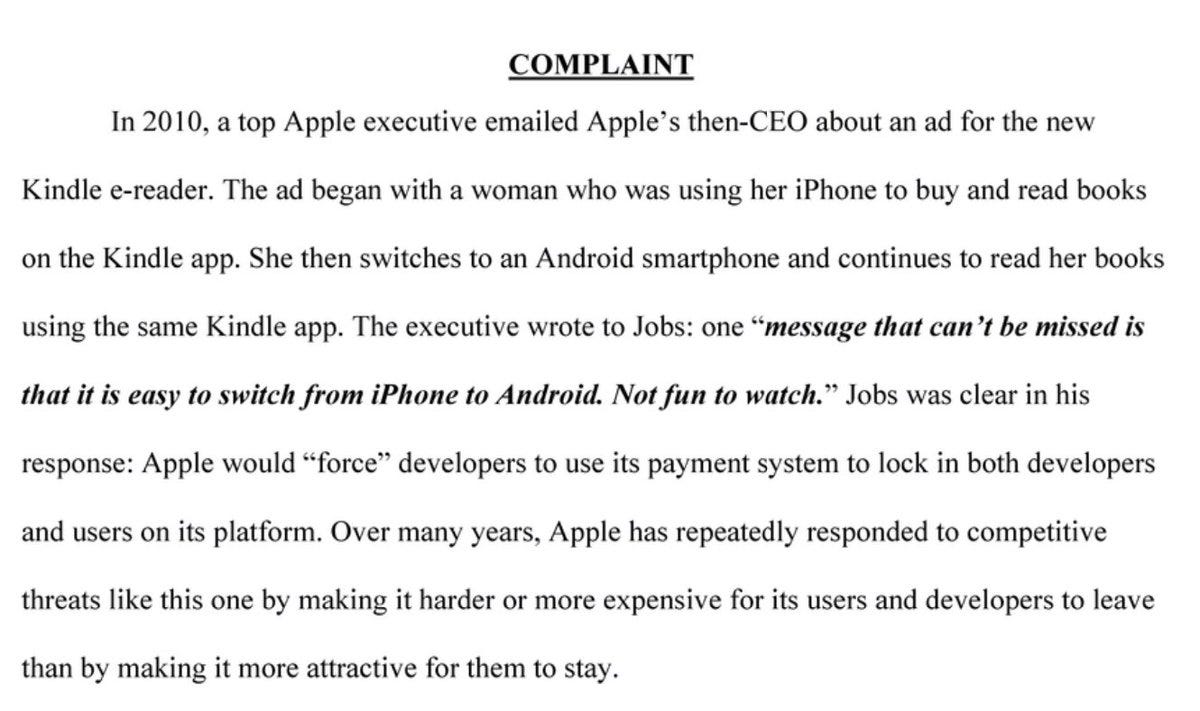

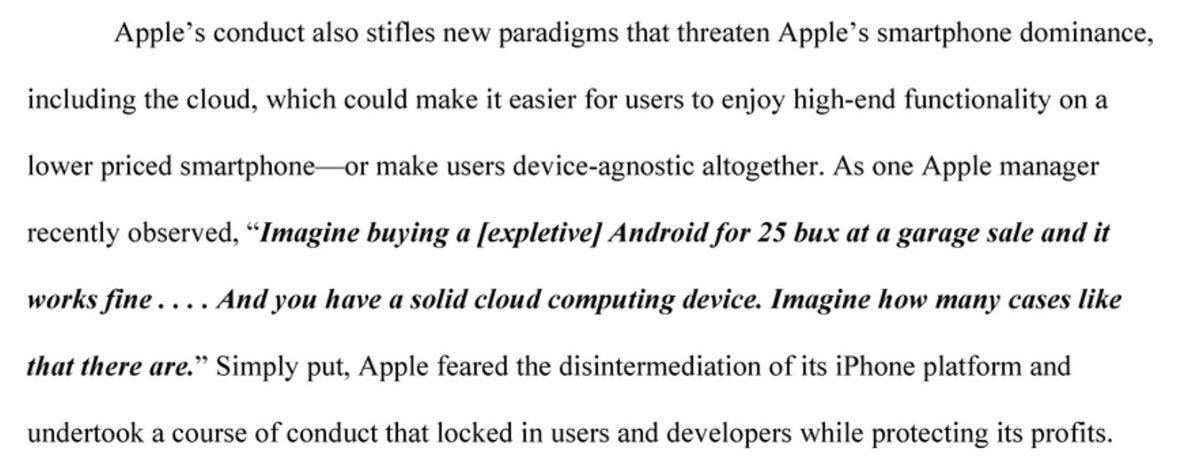


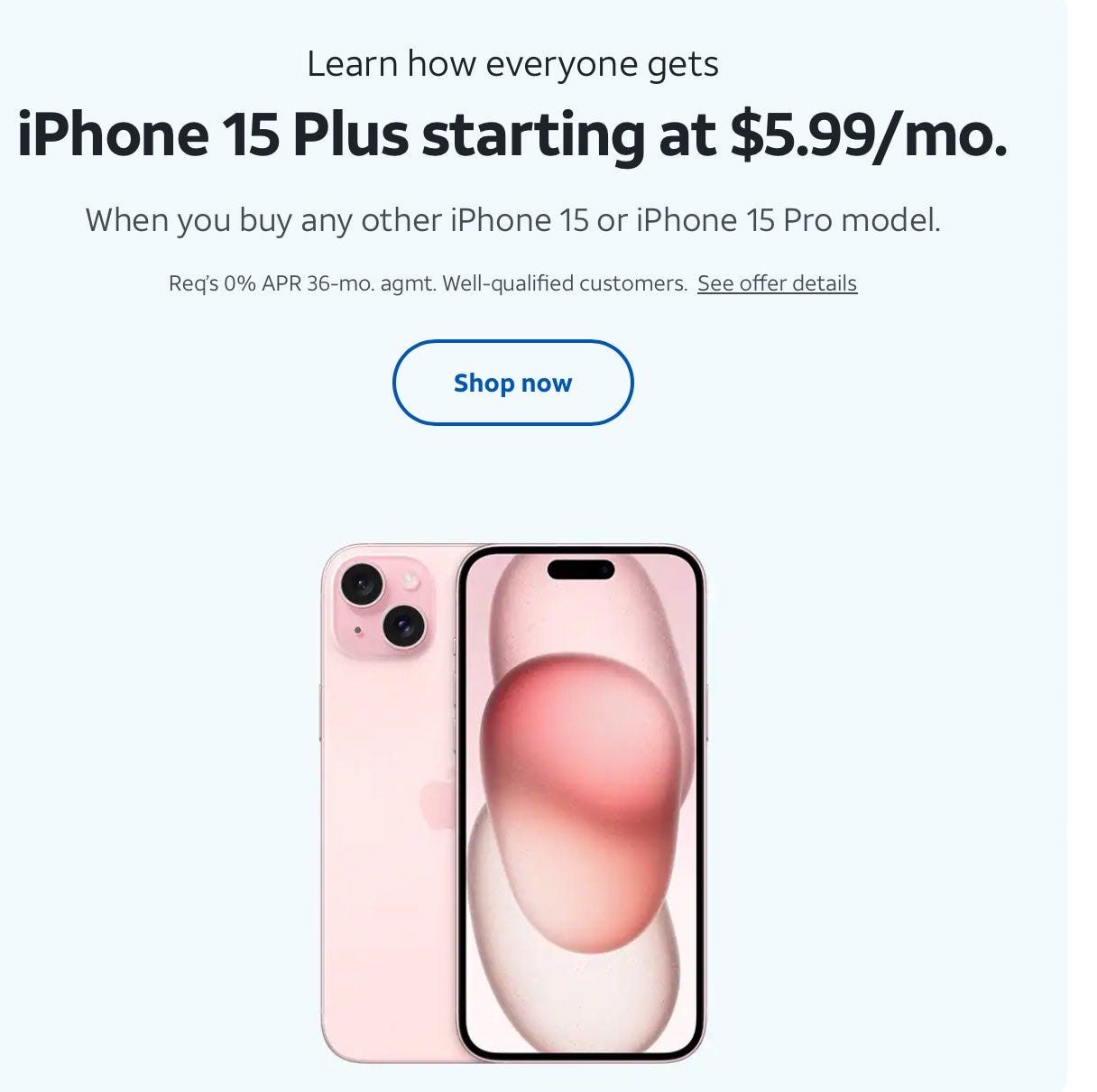
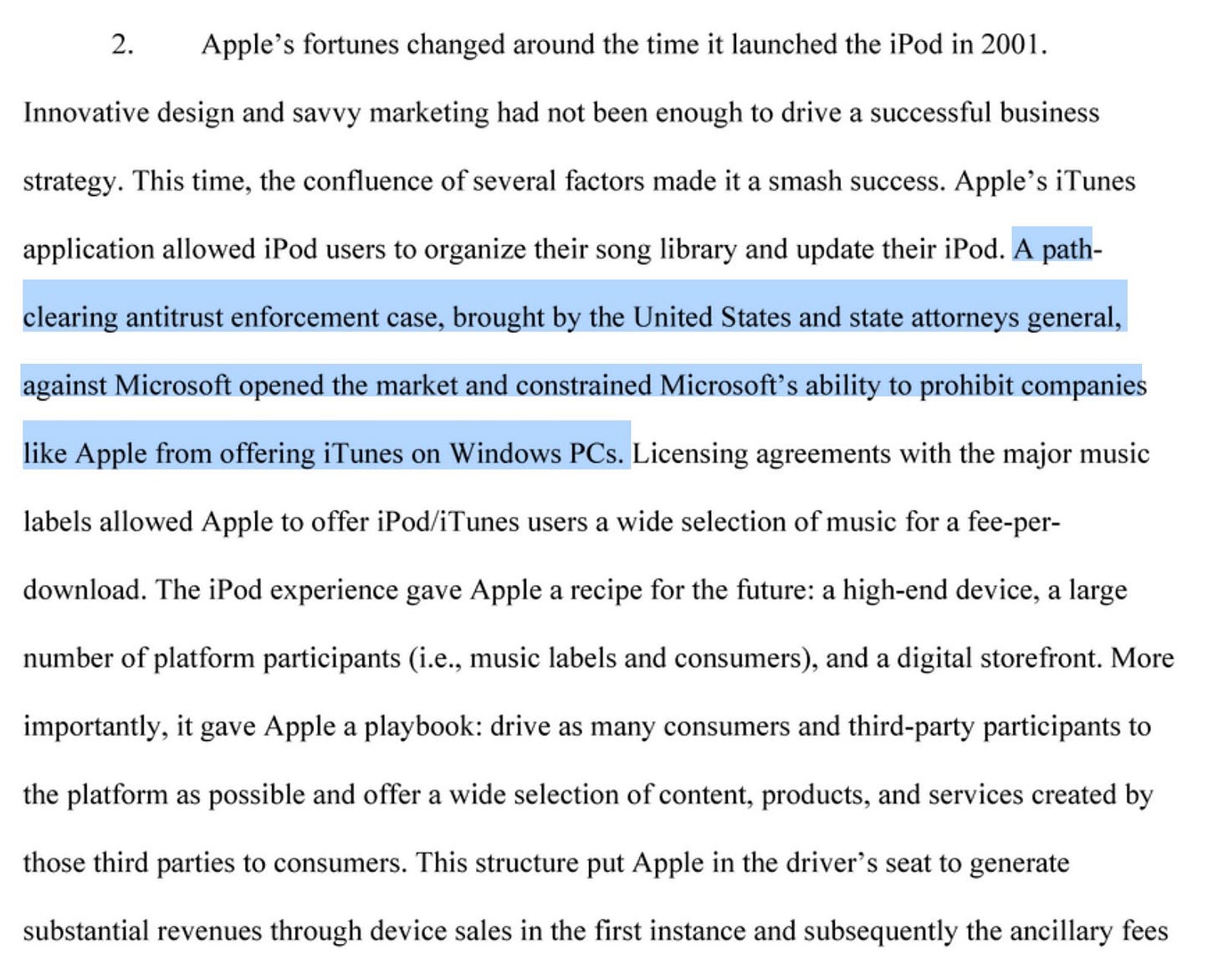
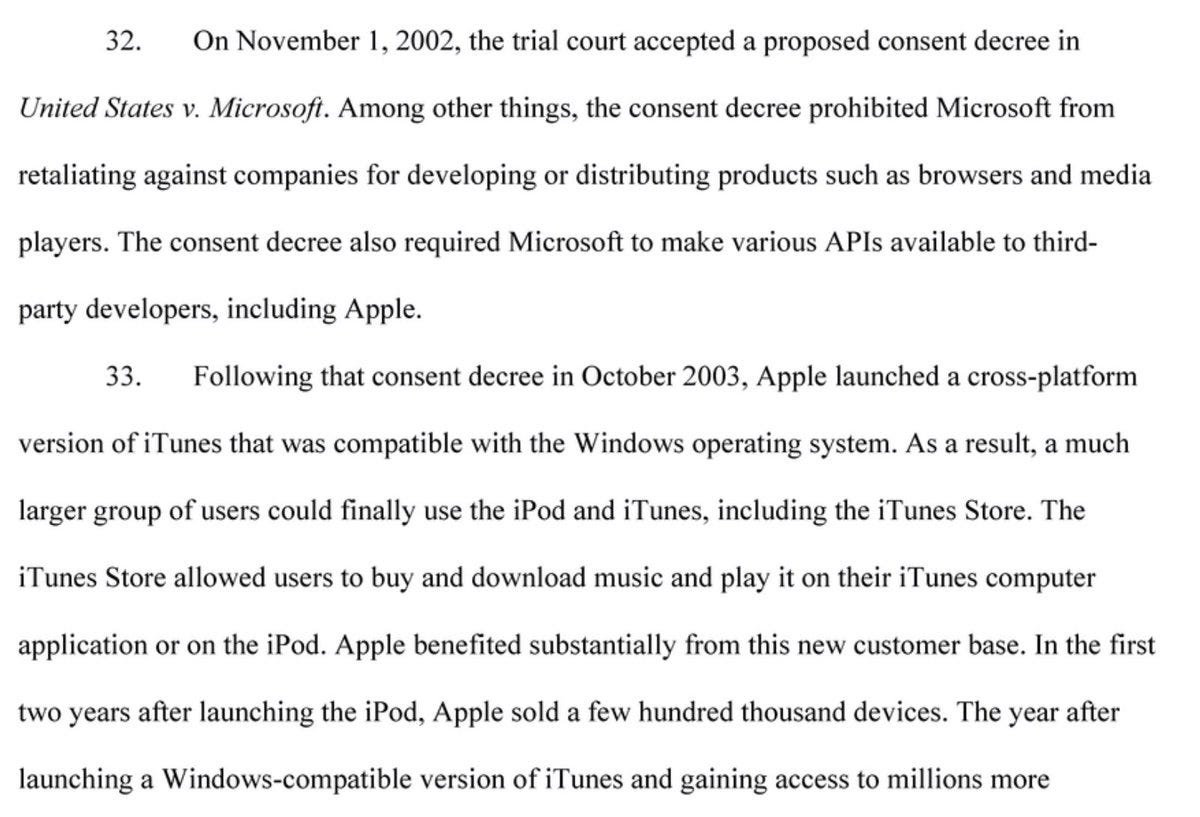
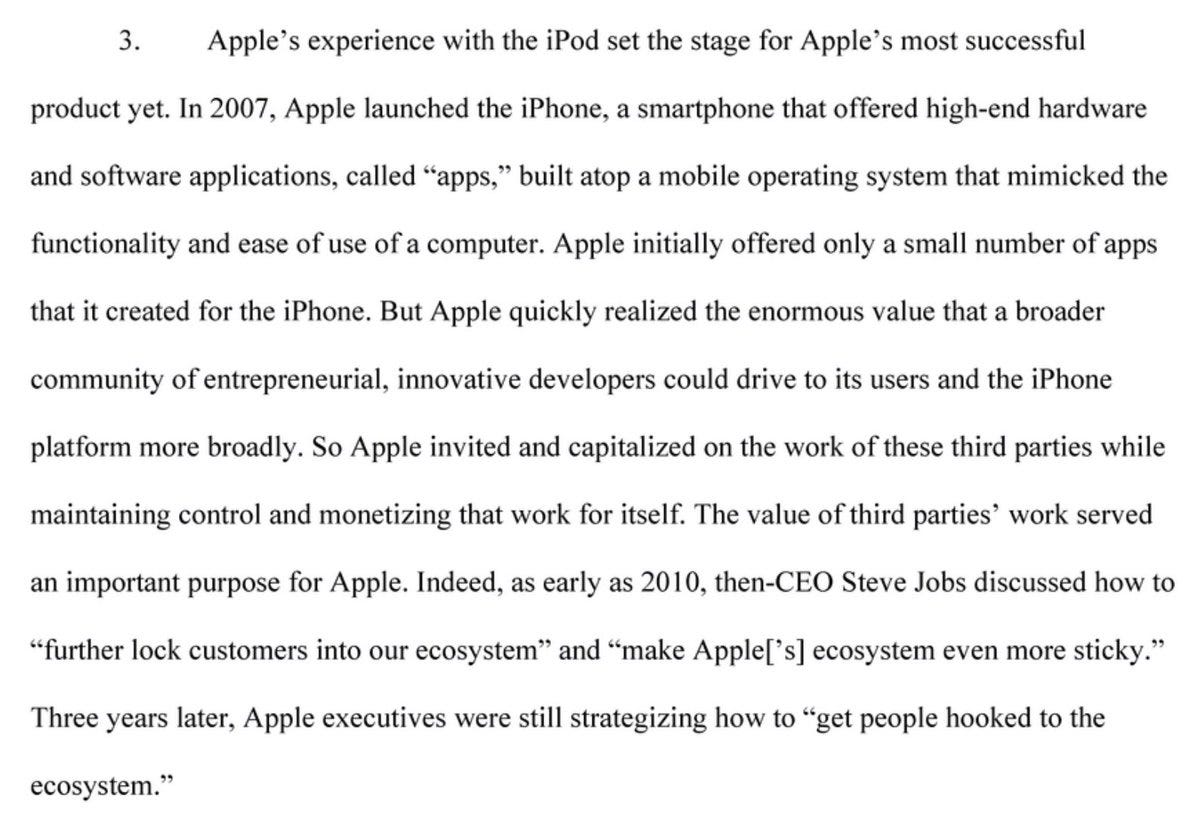
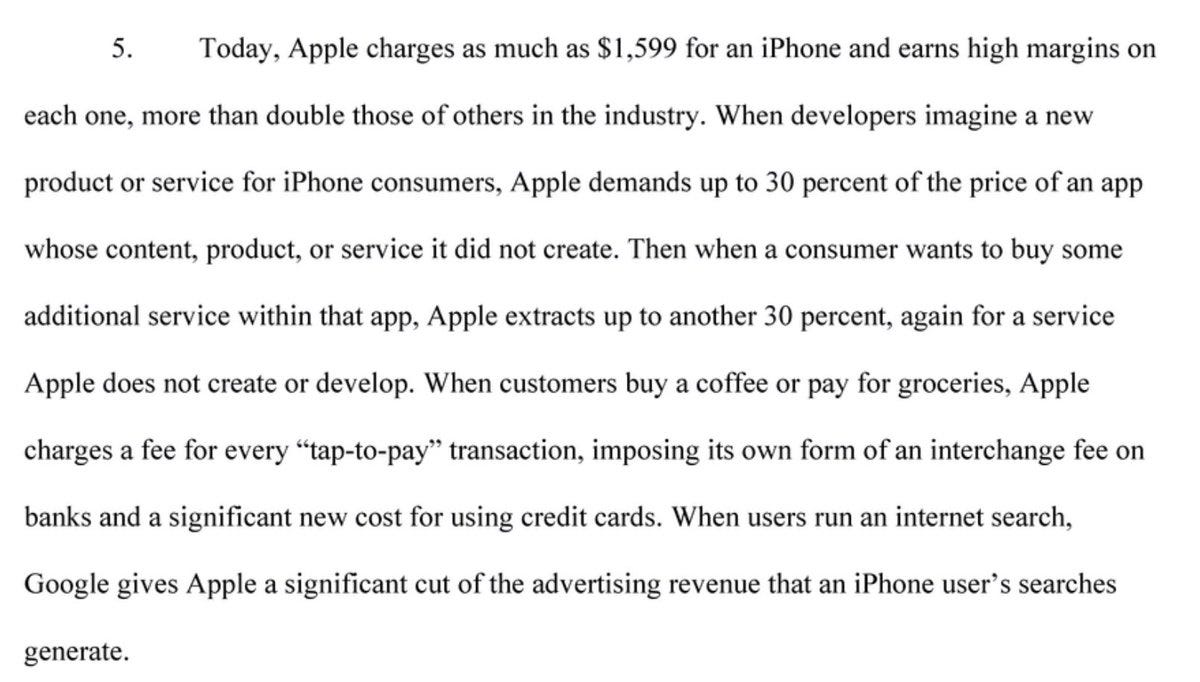
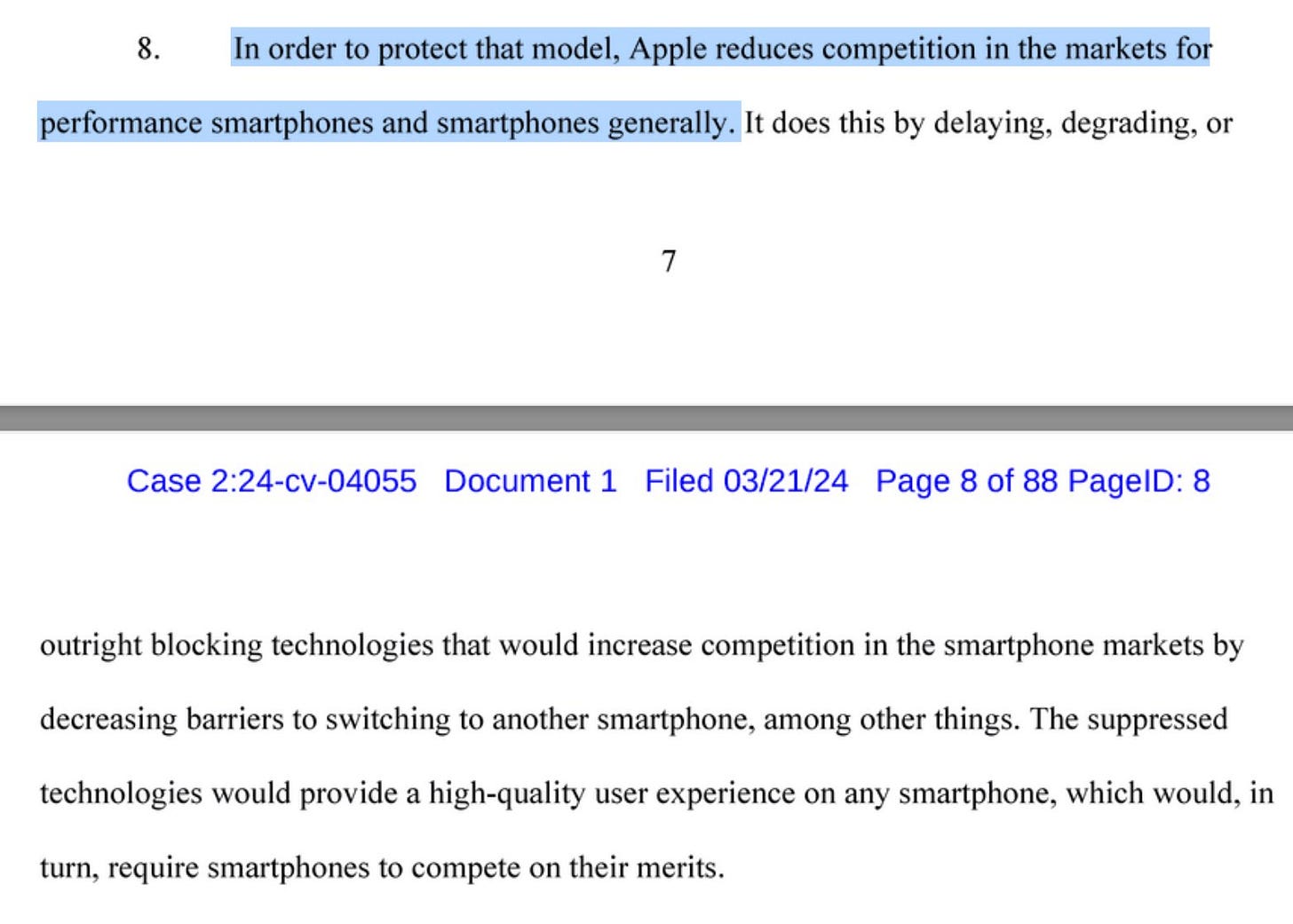
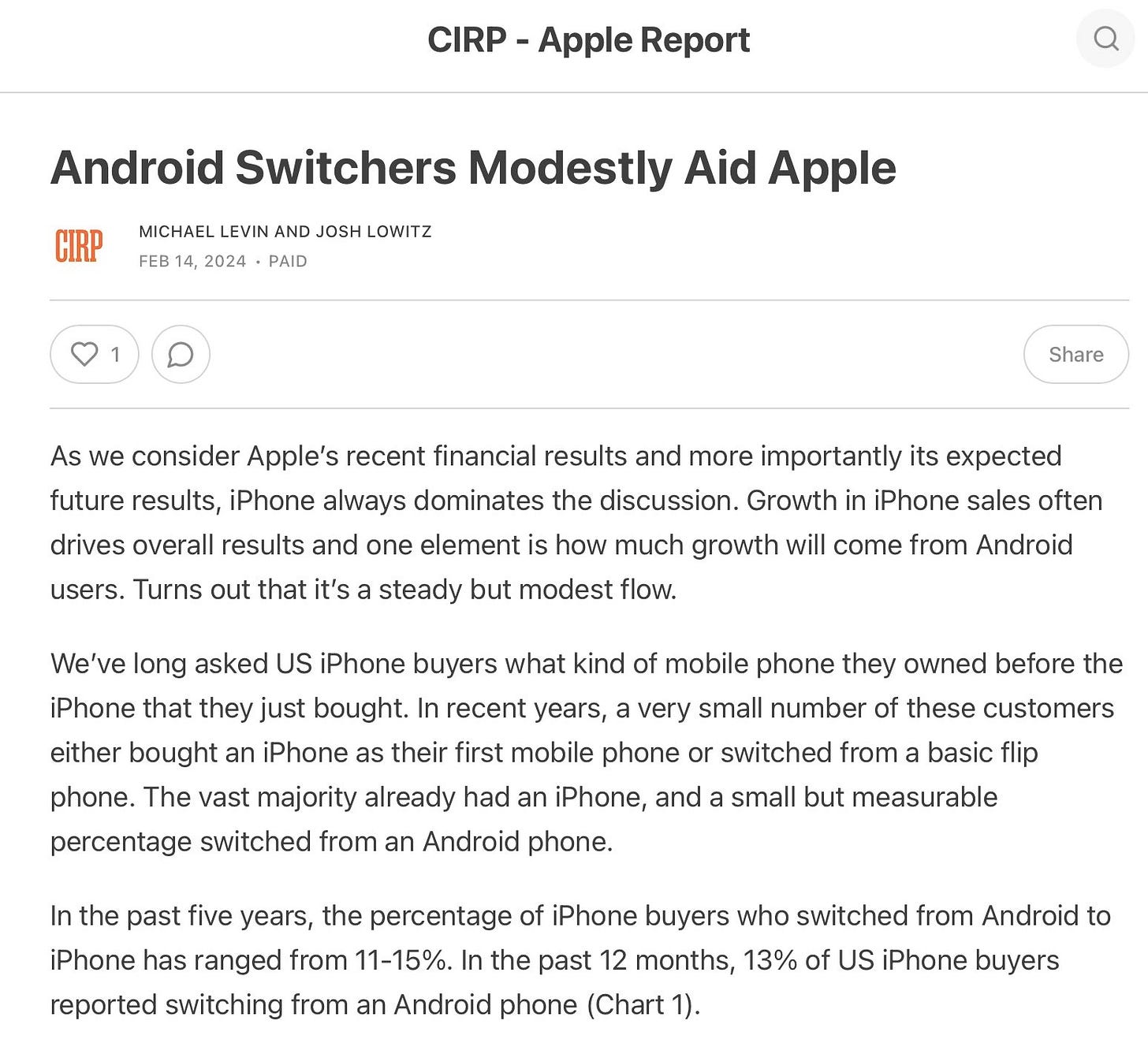
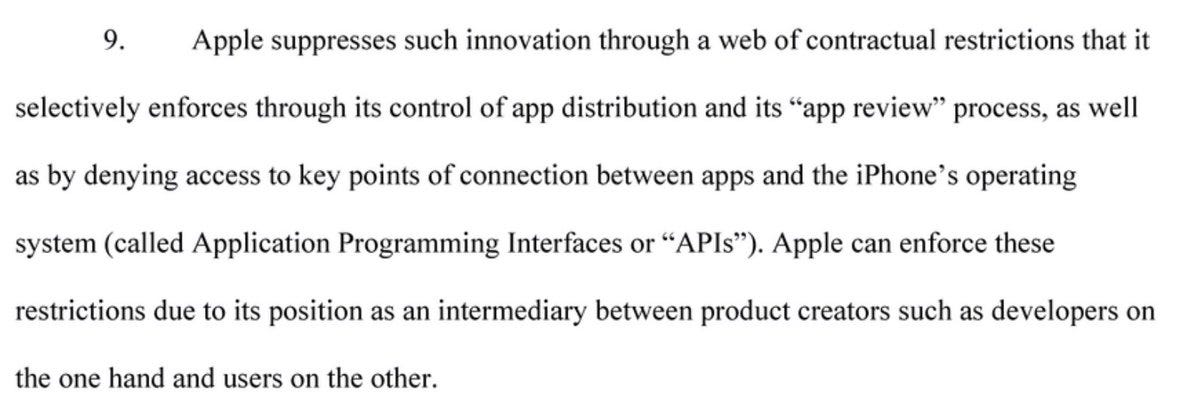
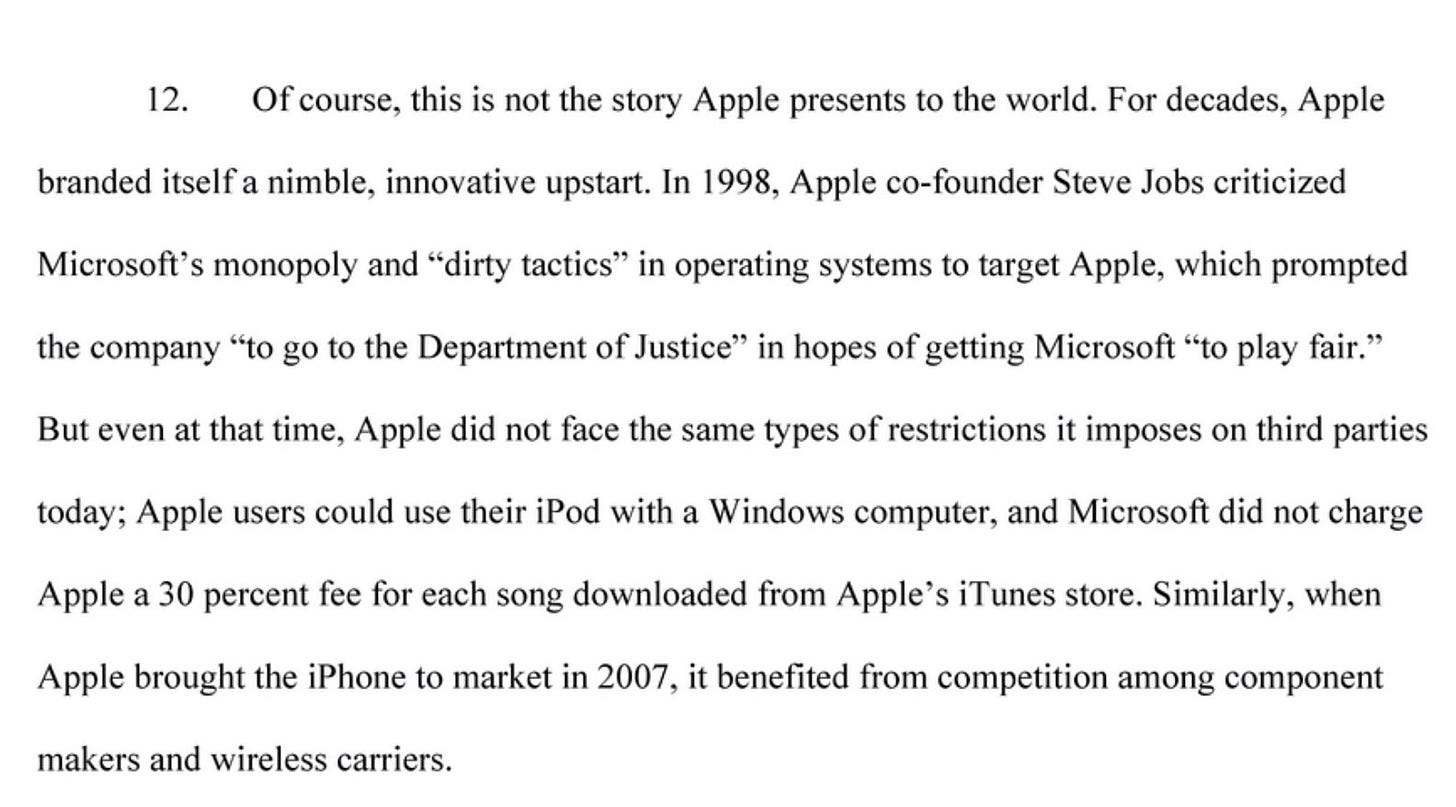
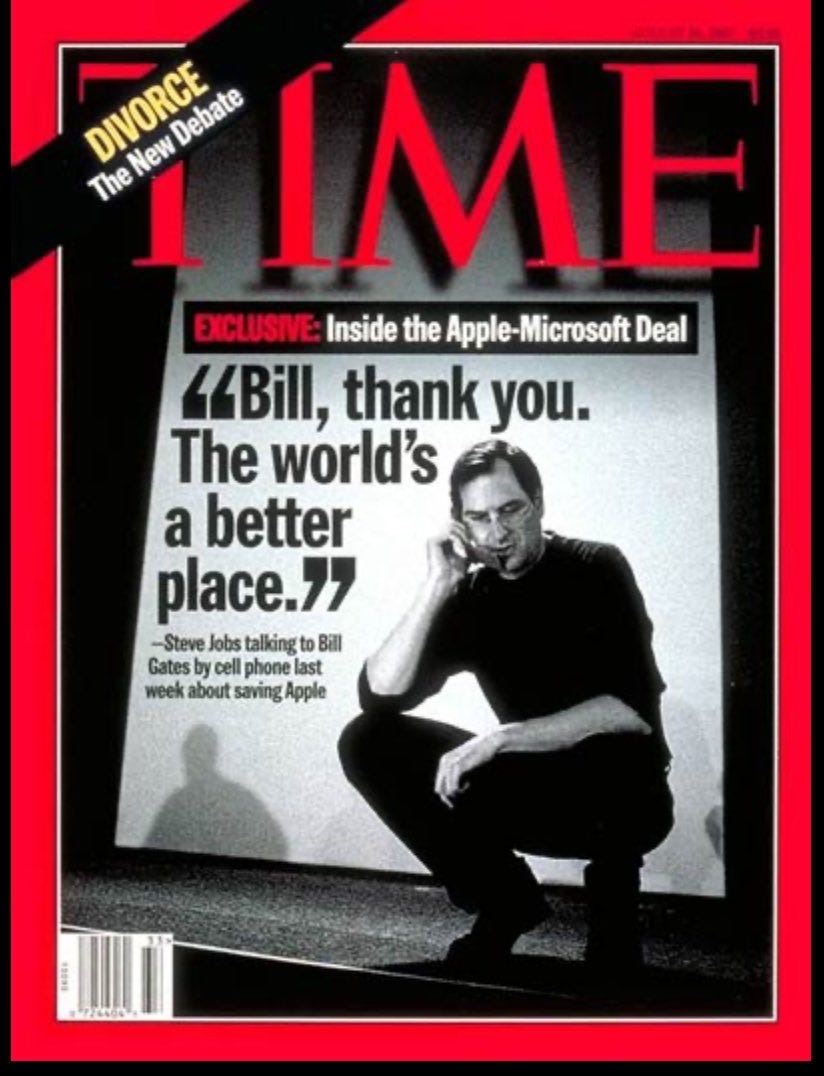

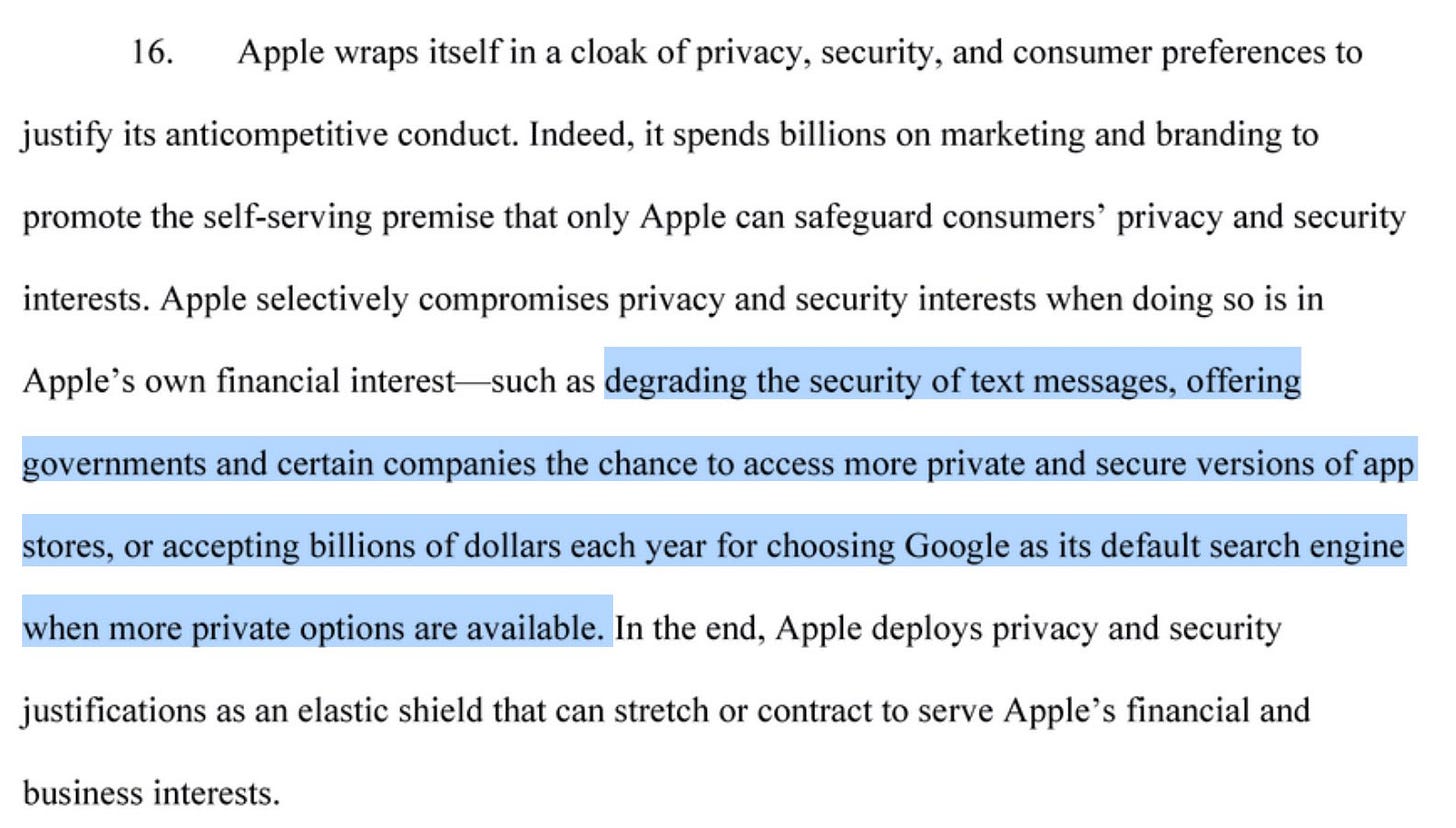
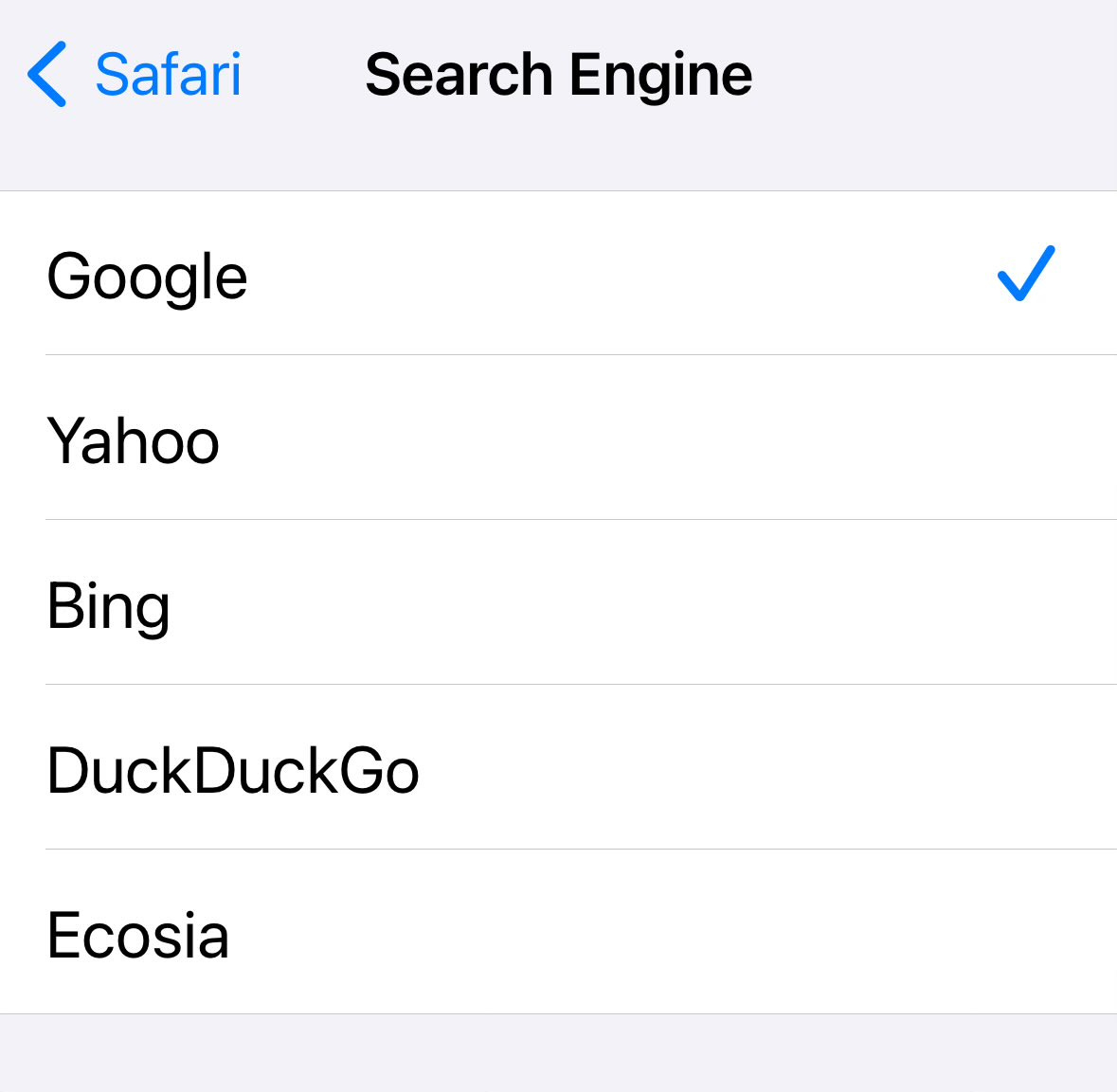
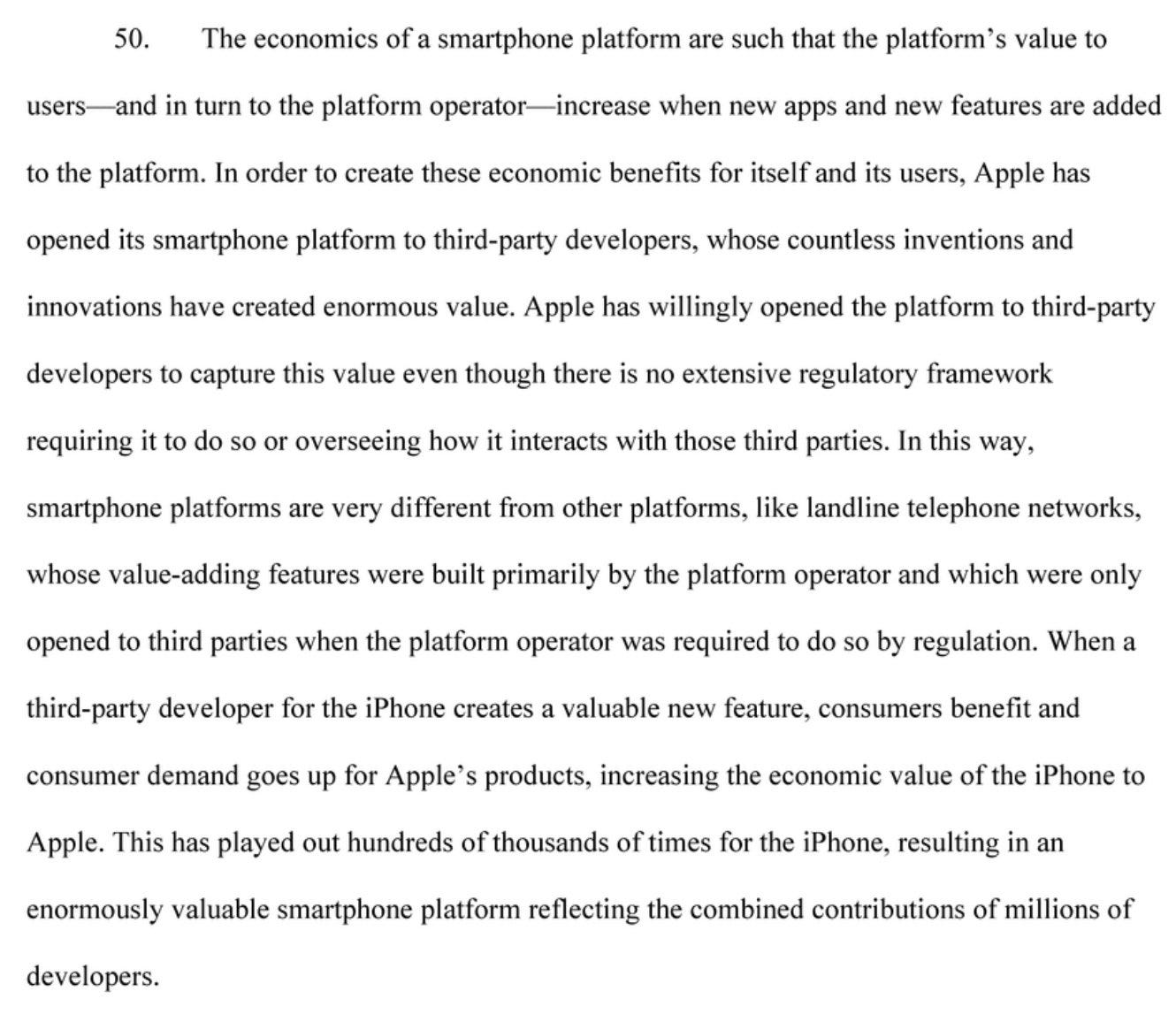
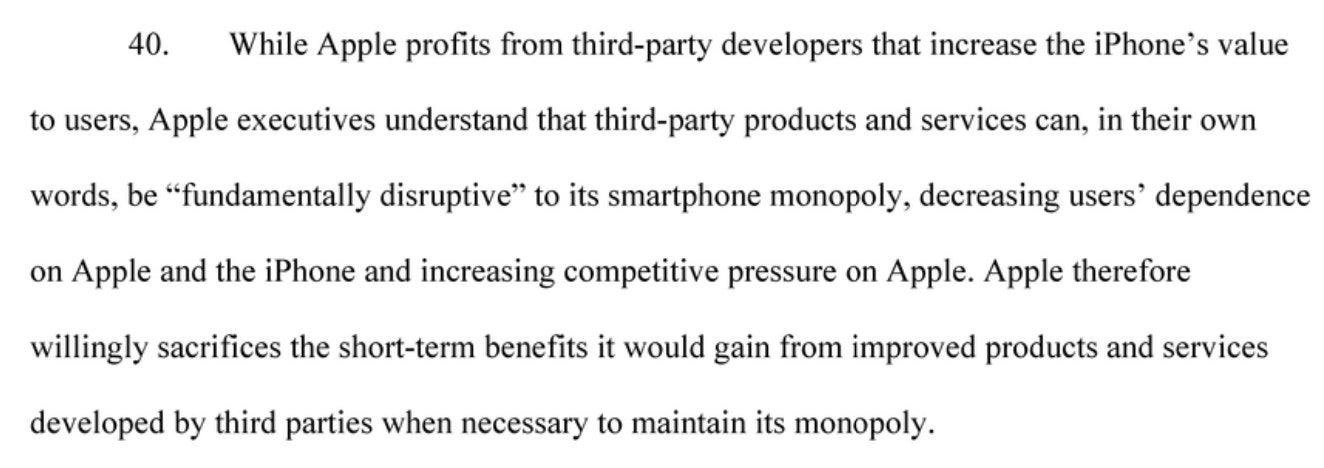
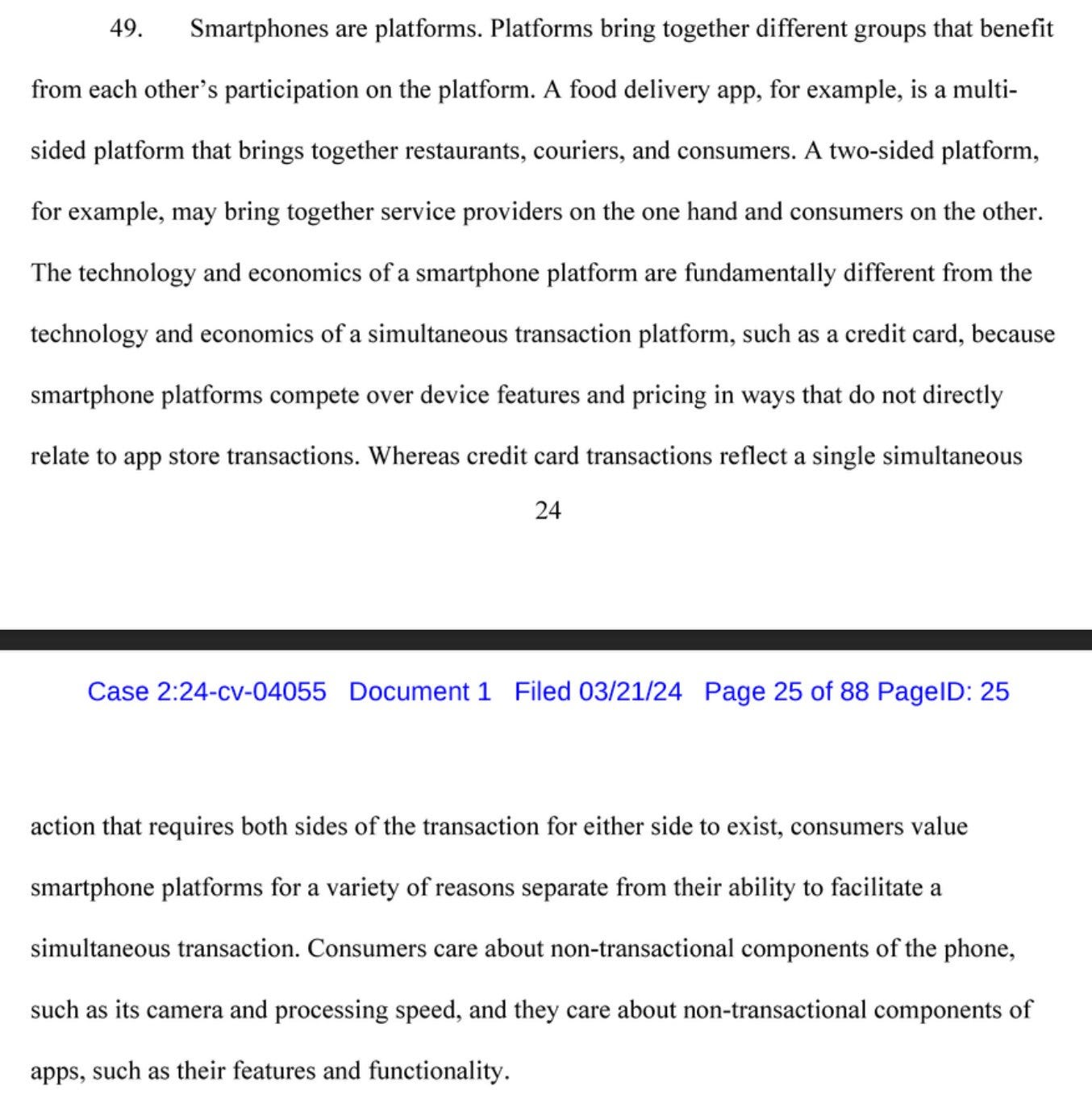
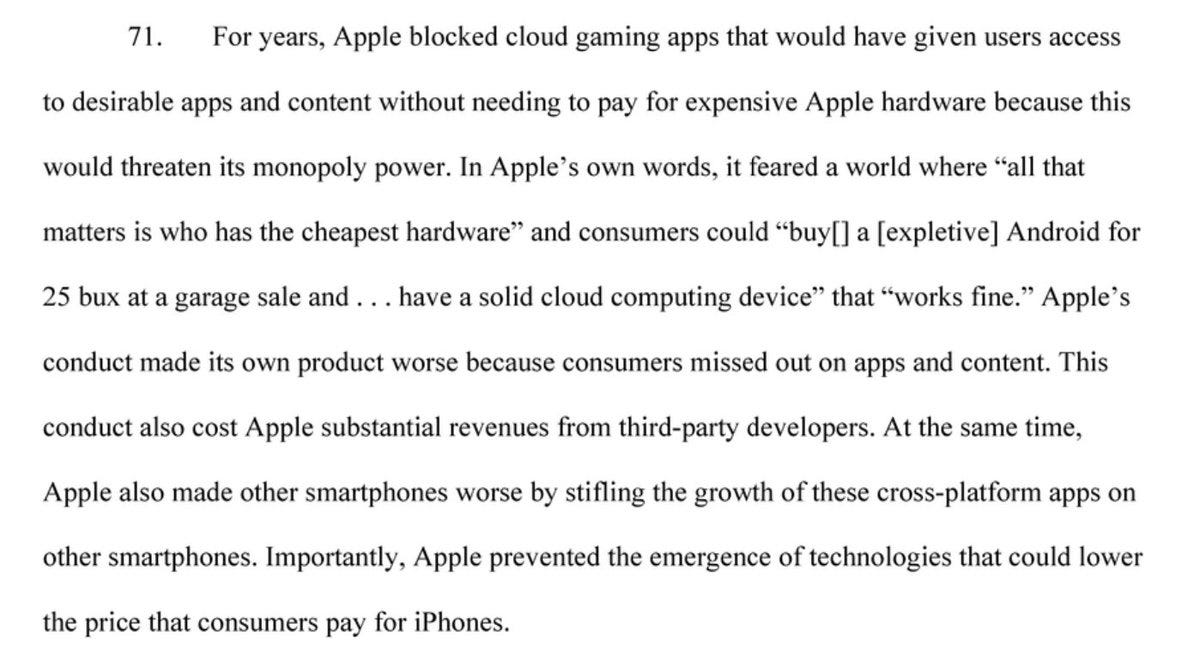


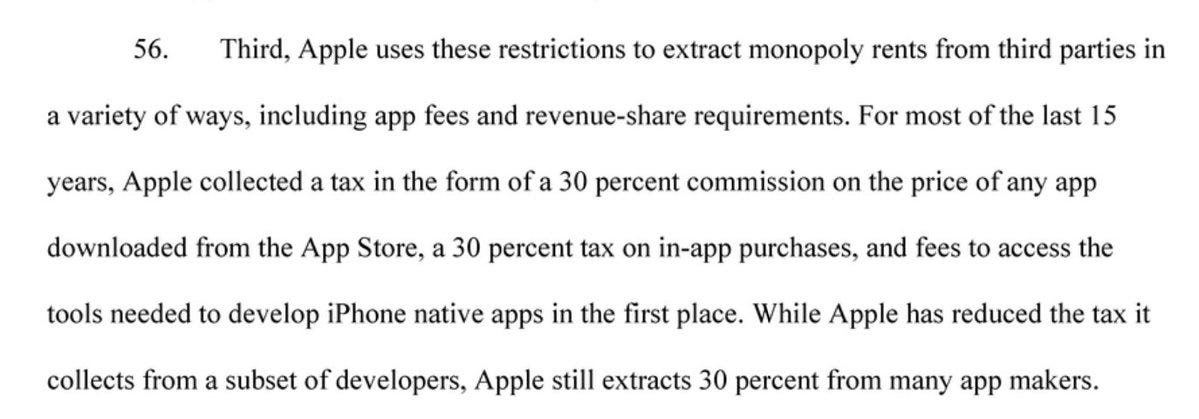
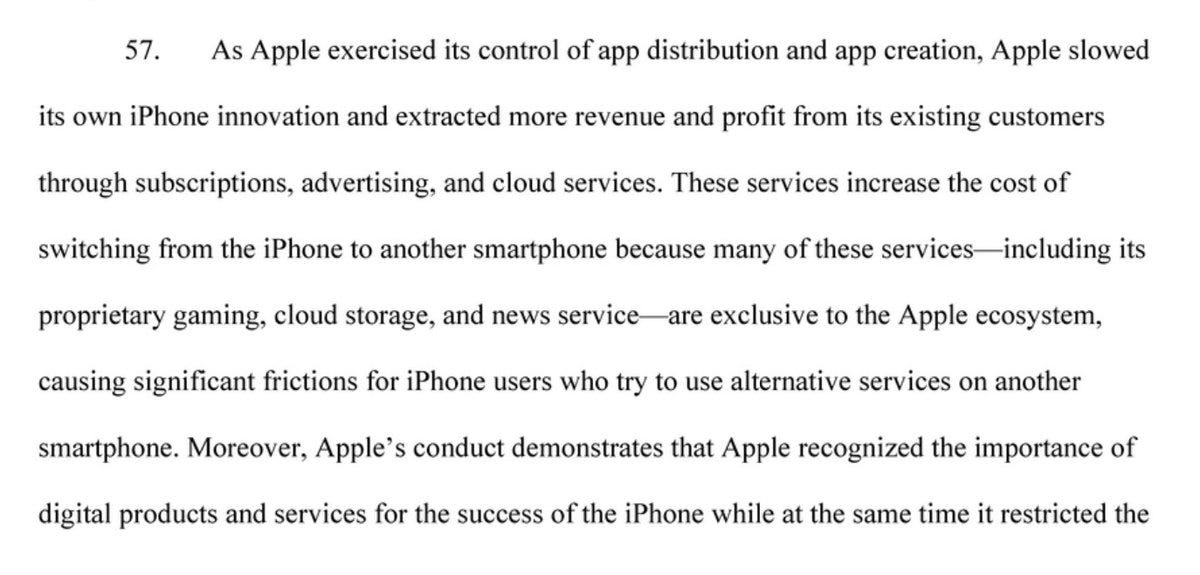

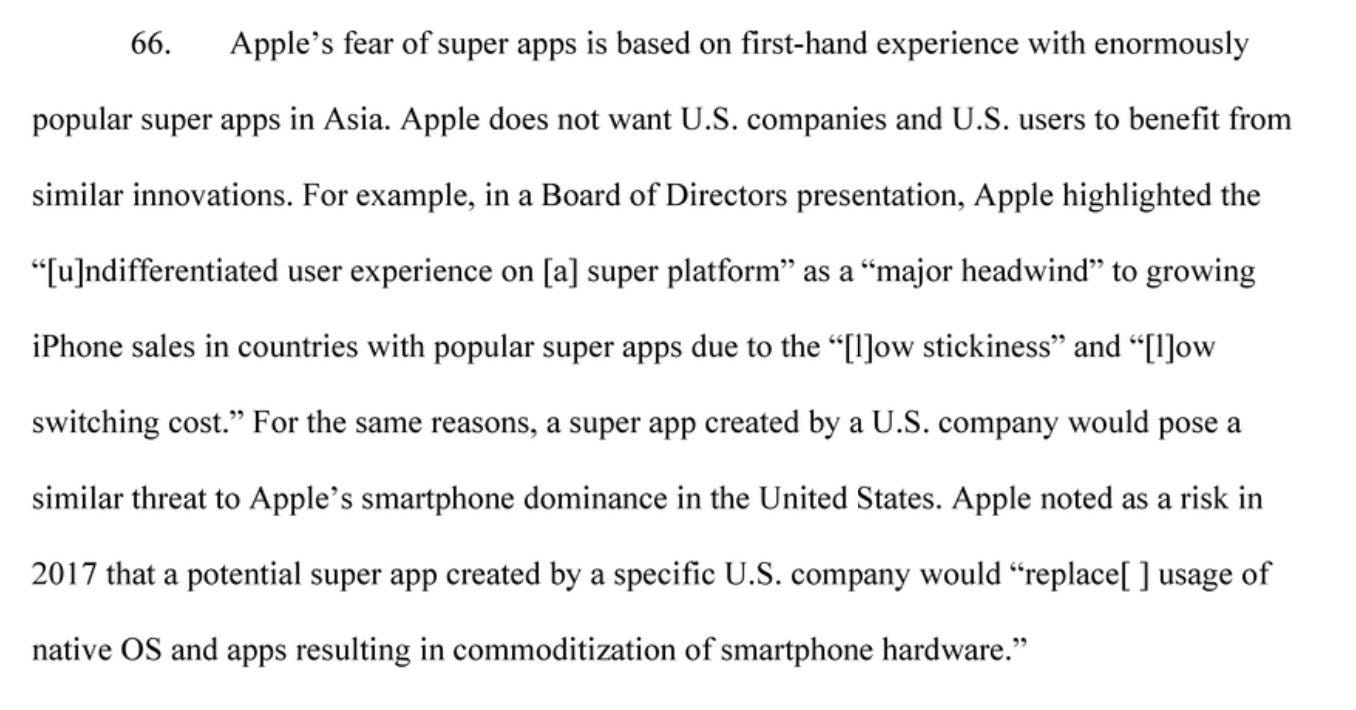


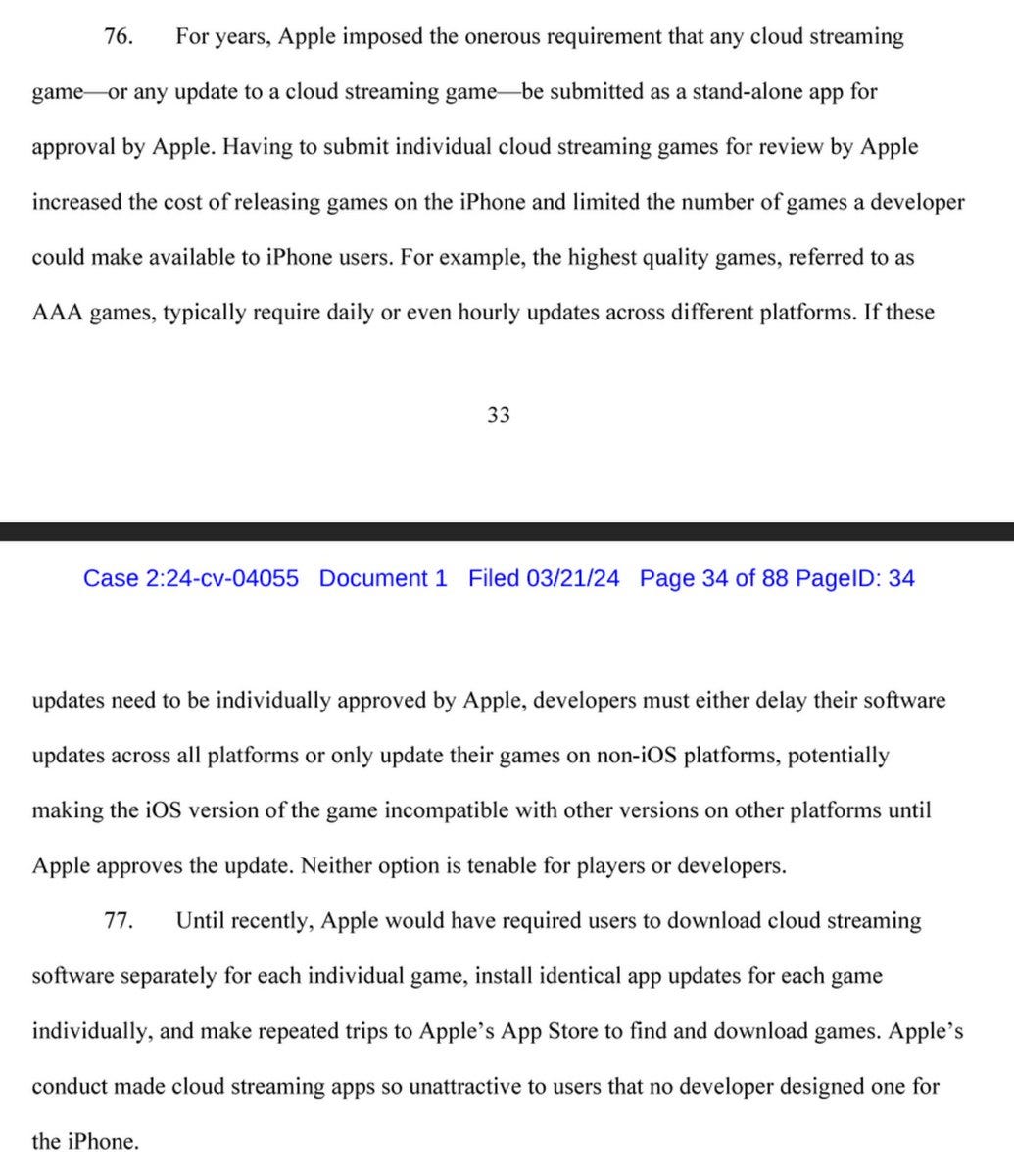
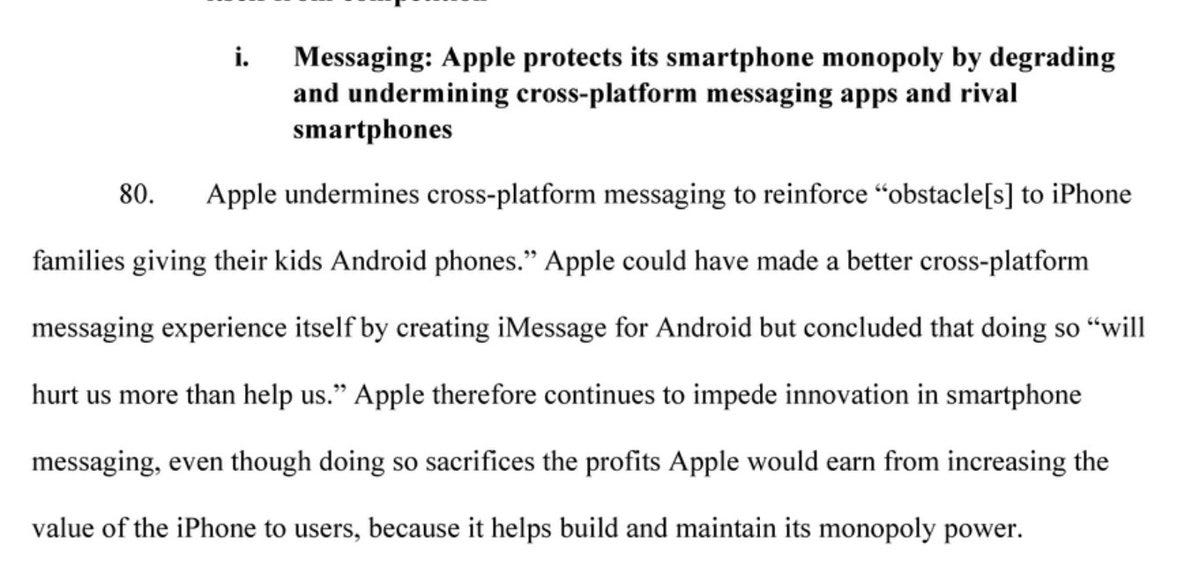
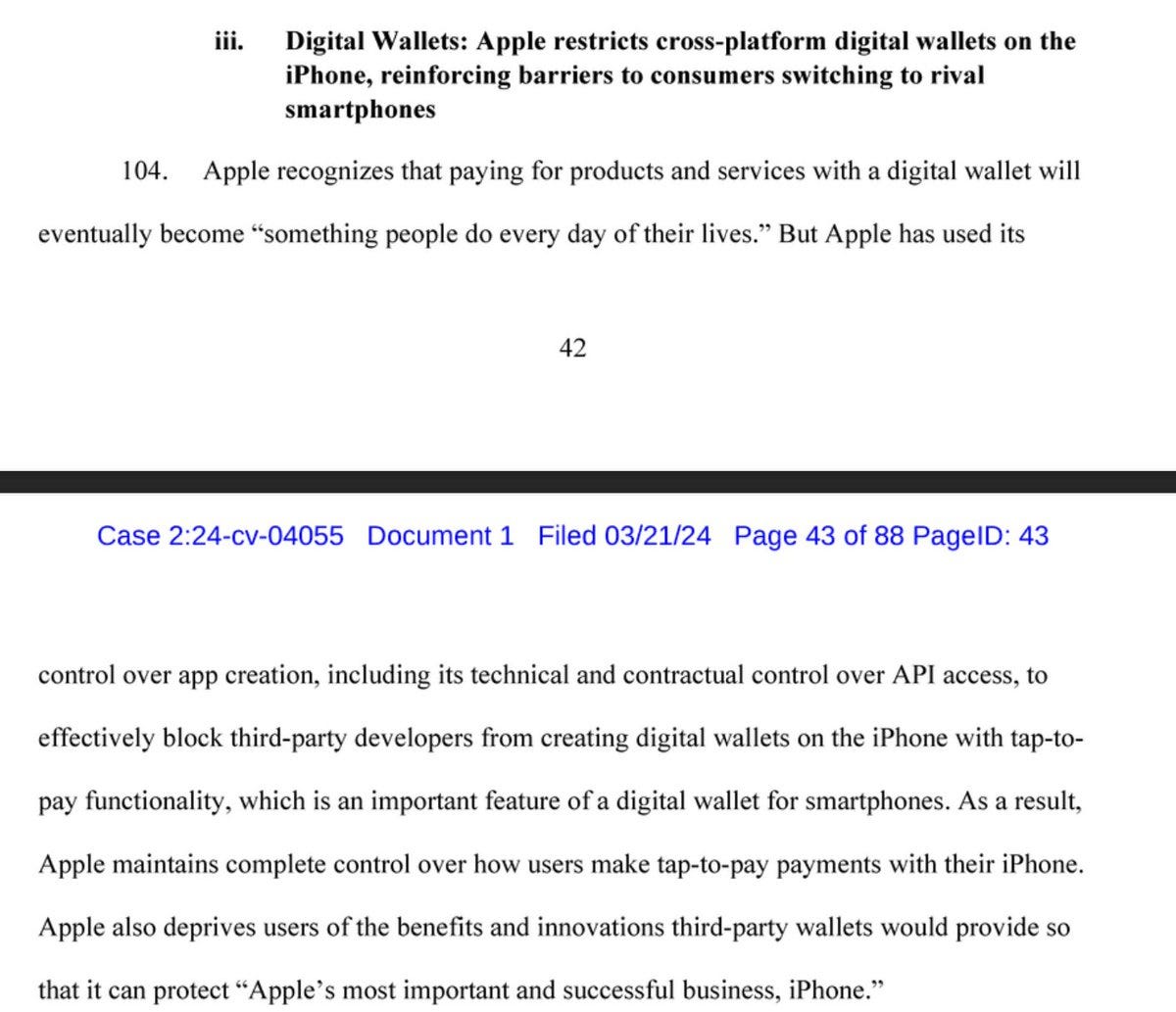
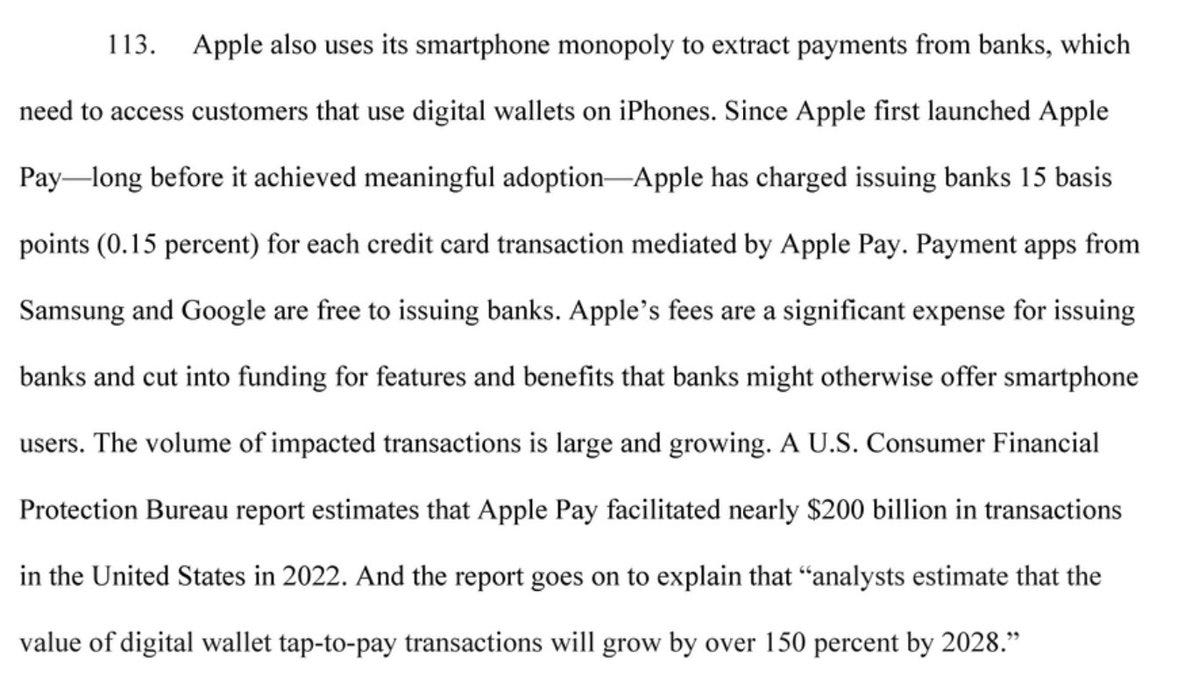

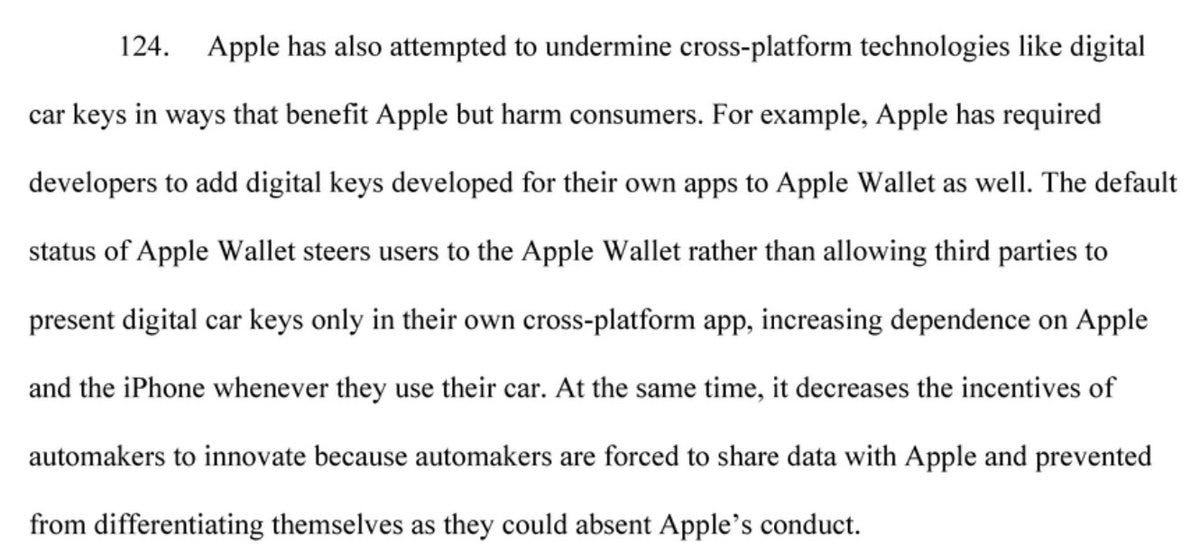




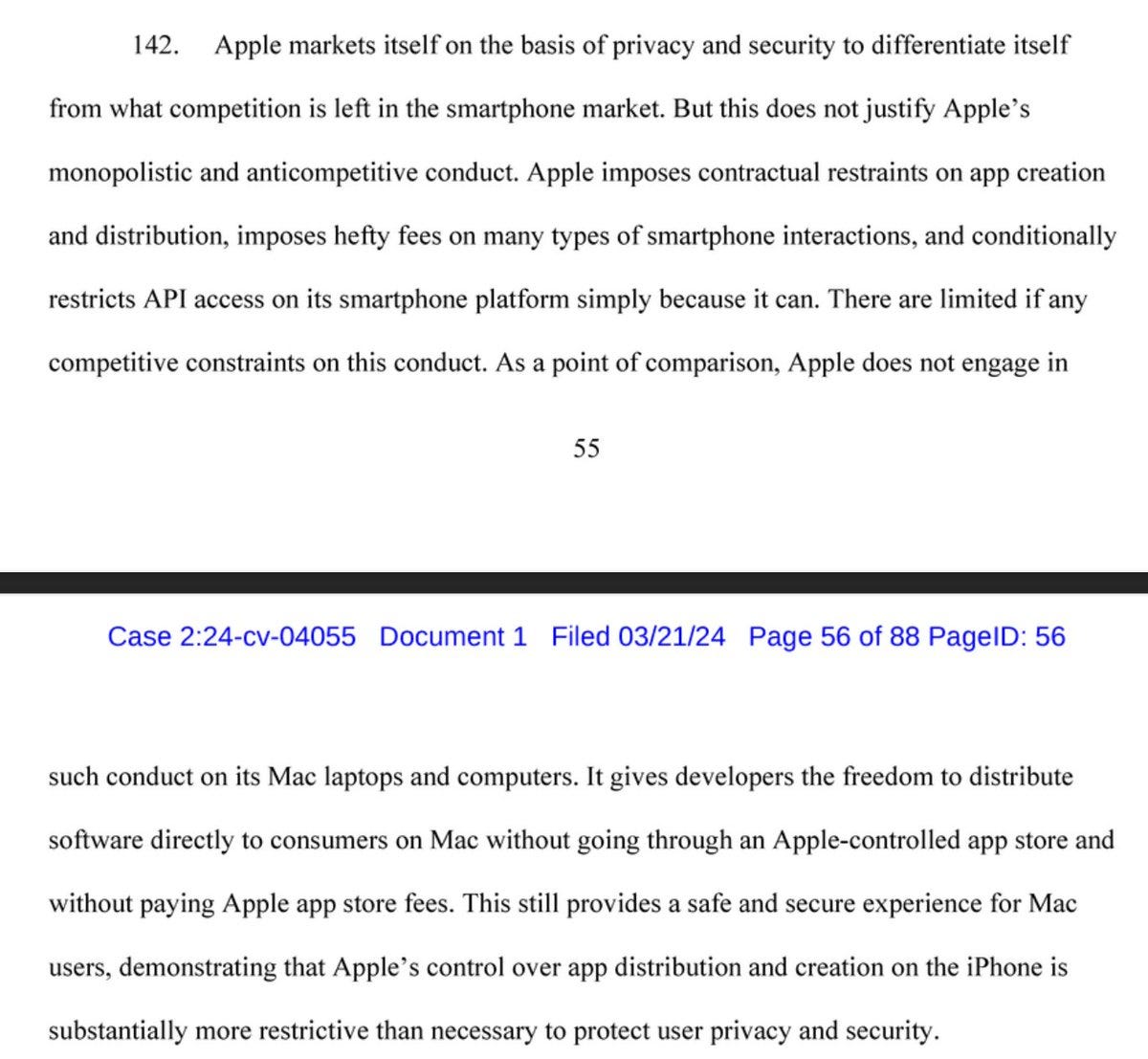
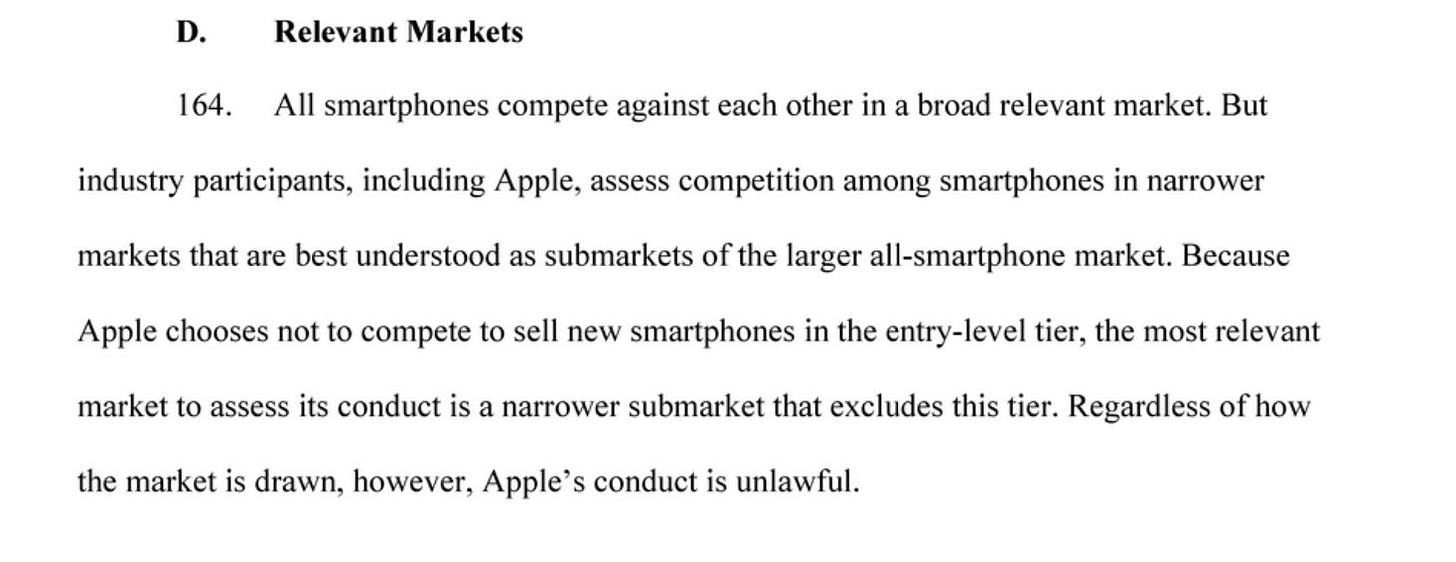

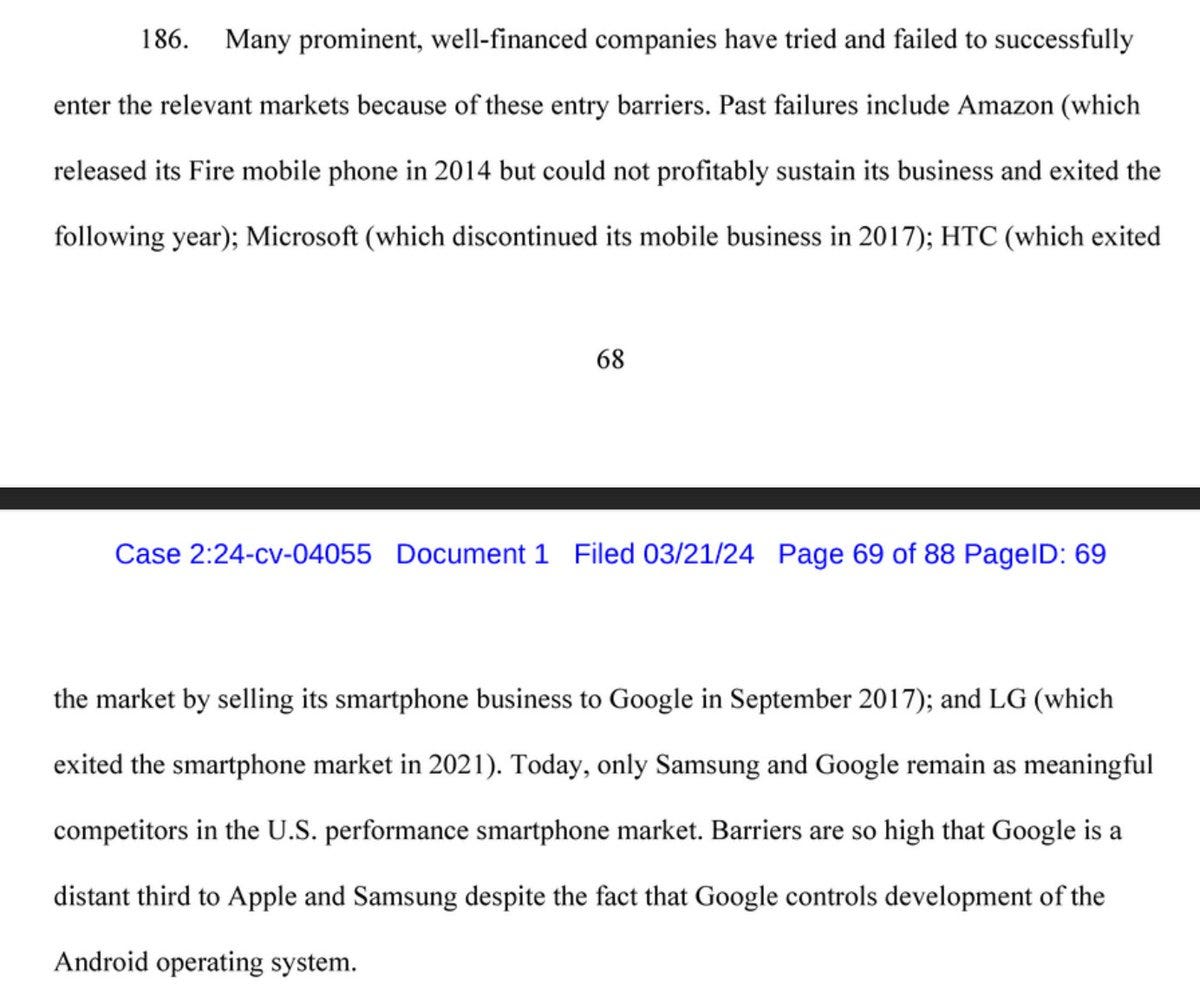
Another great piece, Steven. Ultimately all of this reeks of a more basic trojan horse: EU and US governments using these maneuvers to reduce iOS security for enhanced surveillance.
I find this sort of thing absolutely ridiculous. The DOJ is essentially trying to tell people what features they are allowed to implement in a product and also how those features get implemented. I hated this when it happened to Microsoft, and I found it absolutely insane. As an example, if I made a hammer that was better than all other hammers, and people bought my hammer but that hammer happened to also have a bottle opener on it, would the government then be able to say that I leveraged my monopoly on hammers to gain a monopoly on bottle openers? It is more sensible to say that for some reason people preferred my product, and that all I did was supply people with a product that they found valuable. Why should such a thing be illegal?
Yeah... I suppose I am not adding anything to the conversation here, but thank you for the write up SteveSi. Your insight is appreciated.